












Lenny Osler News Reporter










The MP for Bristol Central posted on X for the second time this month to condemn the Home O ce, as students with fully funded scholarships to the University of Bristol remain in Gaza.
On October 21 Carla Denyer, former Green Party co-leader said on X:
‘The govt promised it would help all Palestinian students with funded places at British universities to get to the UK - but there are students with places at the University of Bristol who the Home O ce is refusing to help. Devastatingly we don’t know if they are still alive’ Denyer questioned whether the lack of progress on the evacuation plans is intentional inaction, or failure to deliver policy in time on the part of the Home O ce, speaking to the Bristol Tab.
In August, the government announced its

plans to evacuate from Gaza nine Masters students on the Chevening Scholarship, and approved plans to assist 30 more students on other, fully funded scholarships to leave Gaza.
Denyer’s post on X is her second on the topic this month. On October 9, she expressed her frustration at the progress of the evacuation plans approved by the Home O ce in August.
A key obstacle appears to be the Home O ce’s

requirement of biometric approval for visa applications. There are no visa centres in Gaza to submit fingerprints, and those located in the West Bank are inaccessible since Israel restricts cross-border travel to and from Gaza.
The University said in a statement to Epigram, that in supporting these Palestinian students it had adjusted fees, given accommodation... 1.11.25
> Continue reading on Pg. 2












































Julia Mullins
Co Editor-in-Chief
Suddenlywe are in ‘week 7’ of TB1! Week 7 means deadlines fast approaching, dissertation proposals due, and exams looming on the horizon. ‘Reading week’ has just been and gone and if you are anything like me, the reading was nowhere to be seen.
Most importantly, Week 7 means our third issue of Epigram is in your hands! While your dissertation reading may lie abandoned, I do hope you’ll give the paper a read, if only to procrastinate.
Our editors have been getting creative with their print space recently so you can expect lots of new formats like previews, recommendations, and society spotlights. I particularly love Romina’s illustrations for the Community Section and the Art Section's comic recommendations.
In the spirit of honesty, this is my first time writing the editorial. I declined writing the last ones for fear of tainting our tone with my pessimism about university. Had I written previous edito-






rials there would’ve been significantly less gleeful encouragement for freshers, and far more of that third-year dread.
I must say, James has done a bloody great job of filling the — surprisingly — long space with his musings on heating and the weather. Unfortunately, that leaves me little left to discuss. It’s still rainy. It’s still grey. And it’s still cold.
So while James has so far been the cheery one, let me be the one to comfort you when inevitably everything feels awful. Clearly writing under the clinical lights of the recently reopened ASSLibrary is conducive to honesty.
Submitting extenuating circumstances forms, begging for extensions, and resitting exams are all normal and supposed to help you. I’ll be the first to admit that I’ve done all of them.
Thankfully, this term hasn’t been as bad as I feared (I'll get back to you in exam season). Our social sec, Liv, has done a fabulous job keeping me and the rest of the team entertained with co ee mornings and pub quizzes. Our busy social calendar has also included two careers


talks this month as we welcomed back James Landale and Katya Adler. Landale, now a big shot at the BBC, started his career right here as Epigram's very first Editor. He is pictured below alongside some of our senior editorial team.
Behind events like these are our hardworking business team who handle invoices, booking lecture theatres, and endless emailing. Running the team now falls to Eden Chambers who has been newly elected by you all as Managing Director (President) of Epigram!
I’m also pleased to introduce Leah Pollard, our new Equality, Diversity, Inclusivity, and Welfare (EDIW) o cer, who will be helping us to consistently and authentically keep the paper reflective of our student body. I am looking forward to seeing the improvements we can make to existing Epigram events like the Women in Media panels hosted in March.
And that concludes the Epigram admin. I wish you all a great month, I hope you can catch up on some of that reading you didn't do. If not, I'm sure we will run into one another panicking in the ASSL at 2am.



> Continued from the cover

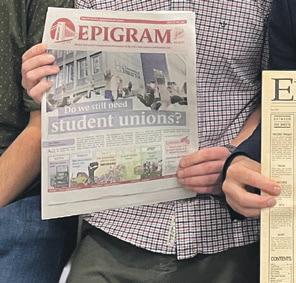
supportive communication’ with the students.




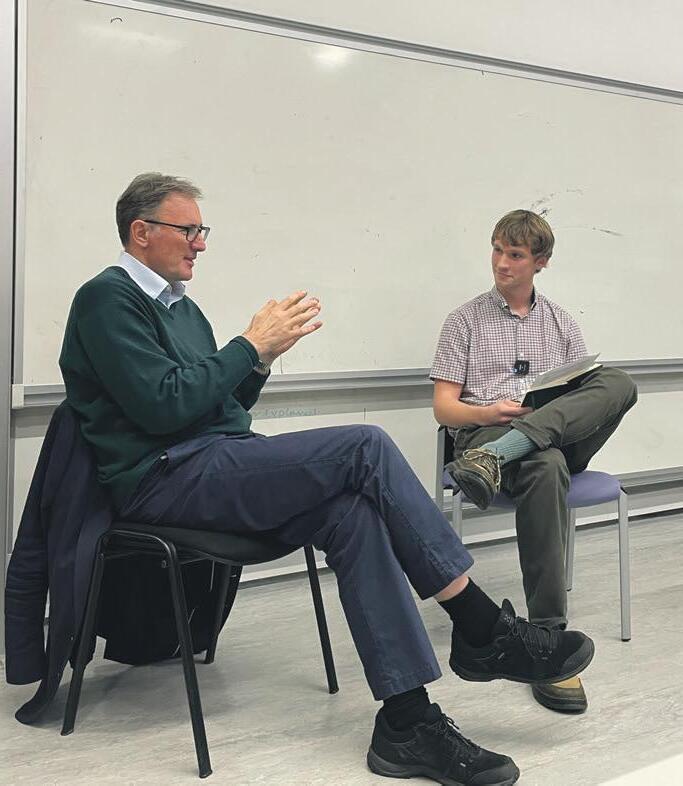

‘The university has made significant progress in its e orts to support the admission and safe relocation of students from Gaza. Seven have been accepted with full funding secured and we are working with the relevant authorities to assist with their arrival to the UK.’


‘We eagerly await the arrival of our new students and look forward to welcoming them into our academic community.’
The University of Bristol o ers the Sanctuary Scholarship scheme to students from an asylum-seeking or refugee community, which covers a full fee waiver and living cost stipend.




















We've teamed up with Overhead at UoB to give you exclusive quotes across campus and beyond. Follow them on Instagram: @overheardatu0b















‘Have you ever done any charity work?’
- ‘yeh I lived in Badock for a year’





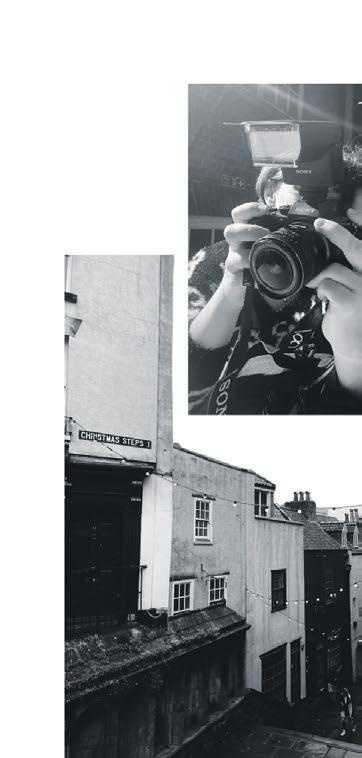





‘I think I found myself more last night in Document than in my whole gap year’









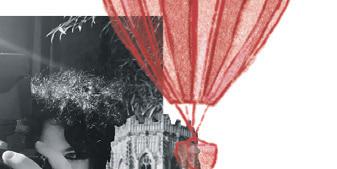





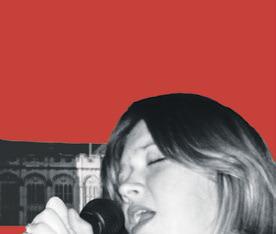









‘It’s barely sharking, I only graduated last year’





When his masculinity was questioned: ‘You know I grew up hunting right?’







We are looking for photographers to contribute on an ad-hoc basis. Your role would consist of taking high-quality photographs that we can use both in print and online. Join the WhatsApp chat & email editor.epigram@gmail.com with






1) Your name, course and year group 2) A simple portfolio of your work



Or are you an illustrator?
We are always looking for illustrators and graphic designers to create art for both print and online Join the WhatsApp chat & email editor.epigram@gmail.com with
1) Your name, course and year group 2) A simple portfolio of your work or illustrate something for an existing Epigram article of your choosing






• Be the first to hear breaking news on campus and student analysis on a wide variety of issues at university and nationally.
• Contibute to Epigram's agony aunt column, exclusive to the print & take part in interviews for our features articles!
• Keep up with our editorial team behind the scenes.
• See details of our socials, upcoming formals and paper distribution days.



Counter-protestors overwhelmed a larger than usual anti-immigration side.
Lambis, Oliver Poyser, & Dana Datu Deputy Editor, News Print Editor, & News Reporter
Roughly 100 anti-immigration protesters and 400 counter-protesters demonstrated in Bristol City Centre on October 5.
The anti-immigration protesters were led by an organised group called the Bristol Patriots. Their side of the protest was laden with Union Jacks and the St George’s Cross, with some demonstrators both wearing and flying them.
An Israeli flag was also flown, as well as a flag emblazoned with ‘RIP Charlie Kirk.’ That same statement appeared on their signs, which also included phrases such as ‘God Save the UK,’ ‘Deport Illegals Now,’ ‘Stop the Boats,’ and ‘Unite the Kingdom,’ mirroring the name of the rally held recently by Tommy Robinson in London.
An o cial counter-protest, organised by Stand Up to Racism Bristol, gathered at 11:30 AM by the
Neptune statue, away from their designated pen. They were supported by groups such as the Bristol Palestine Solidarity Campaign, Stop the War Bristol, and the University and College Union. Bristol Antifascists were also present. Counter-protesters chanted ‘refugees are welcome here’ and ‘from the sea to the river, Palestine will live forever.’ A table was set up offering attendees free water, masks, sunglasses, and sugary drinks.
Both groups were given separate protest zones by police. Armed with truncheons and with several on horseback, the police had enhanced powers for the demonstration. They could order people to disperse from an area and ask for face coverings to be removed. In a statement released before the protest they warned that ‘failure to comply’ with the temporary conditions would be ‘a criminal o ence.’
A representative of The Bristol Socialist Students – a Bristol SU a liated society – told Epigram that this was ‘the biggest police response to a protest [he’d] ever seen,’ claiming it was ‘completely disproportionate.’
One counter-protestor stood at the other demonstration’s police line with a sign reading ‘it is illegal to deny aid.’ She was asked by police to move on or be in breach of Section 35. Speaking to Epigram, she said she came to the protest so ‘people in Bristol know that wherever they’ve come from,


A sample bust card, providing legal aid for counterprotestors |



they’re very very welcome here.’
In the lead up to the protest residential teams of Campbell House and Accommodation at 33 – University of Bristol first-year accommodations – sent emails to residents warning them to stay safe over the weekend.
And on the day of the protest, the Arnolfini, Watershed, and Spike Island opened up their venues to anyone ‘in need of a safe space’ in the city centre.
At around 2pm, the protesters moved towards College Green, with police kettling counter-protesters to prevent the groups clashing.
The march ended at College Green, where two kettles had been set up.
The anti-immigration protesters went to the western kettle, with a line of police o cers surrounding the barricade. Although never deployed, police dogs could be heard barking from a van. When asked about the dogs, one police o cer said they were a ‘contingency.’




Speaking to Epigram, a representative for Bristol Stand Up To Racism said the protest was organised because ‘we didn’t want the far-right in the streets.’ He claimed that groups like the Bristol Patriots were ‘burning down hotels’ and ‘intimidating [people] with flags’ while ‘saying they were protecting people.’
Another counter-protester said that she felt both groups were pointing fingers at each other, and they needed to speak to one another ‘in the same language – a lot of people can't back up what they're saying, and neither can I sometimes.’
She said that ‘if you want to make change, you have to be better.’
The two groups almost clashed near the end as some anti-immigration protesters began to leave. They were followed by police escorts who created a moving cordon around them. Some counter-protesters ran towards them shouting ‘Nazi scum.’ With very few protesters left, Epigram was allowed through the police cordon around 3 PM.
The protester Epigram interviewed – a ‘mum of two’ who ‘want[ed] a better life for [her and her] children’ – said she was there over concerns about ‘the illegals coming over from France.’
She said that she came to ‘show the government that we’ve had
enough,’ and that they needed to ‘take care of us’ and ‘look after our country.’ She thought the government had a ‘soft touch’ towards asylum seekers, and claimed that many were non-genuine refugees, calling them ‘fighting age men.’
She said that the biggest problem was the government and a lack of candidates to replace them. She said with ‘Starmer, it’s all empty lies’ and that she would ‘not even’ vote for Nigel Farage, because ‘he’s gone weird.’ She claimed that ‘no one’s listening.’
When Epigram asked her about the claims that protesters were fascists, racists, and Nazis, she stated that it was ‘the easy answer – just to tarnish everyone with the same brush.’
With the protest coming to a close, and only a few demonstrators left standing, the counter-protest descended into a tense but party-like atmosphere. A speaker had been set up, playing a techno-style song, with the lyrics ‘Bristol is anti-fascist.’
In a statement, Avon and Somerset Police said three arrests were made during the protest for ‘assault or public order o ences,’ but ‘no-one is understood to have sustained significant physical injury.’
All three of these individuals have now been released, according to the BBC.




it take to end gender inequality?’
Arthur Clinton, News Reporter
TheLabubus, bad poems, and a vibrator marked this unique Bristol event.
Sofia
Lambis, Deputy Editor
On October 9, hundreds of students gathered at College Green for Overheard at UoB’s performative male contest. Armed with tote bags, Jellycats, and in one case their mother’s sewing machine, 17 men competed for the title of ‘most performative male.’
Epigram’s News Print Editor, Oliver Poyser, went (semi) undercover as a contestant, using the paper's Rugby World Cup article to prove his love for women's sports.
The competition’s organiser, Udoka, first approached Overheard at UoB after being inspired by Timothée Chalamet lookalike contests. Up for grabs were the coveted prizes of tampons, condoms, and a tote bag, as well as a week’s worth of matcha from the Source Cafe.
The event kicked o with a catwalk, where contestants hurled sanitary pads at the crowd to cries of ‘smash’ and ‘woof.’ One competitor handed a bouquet of baby's breath to a woman in the audience, and later took it back.
Next, the performative males lined up for a talent round. They were given the chance to display their skill and answer some of our time's most pressing questions, such as ‘how much matcha would
Contestants lamented period pain, mistook Billie Holiday for Billie Eilish, and at one point confidently shouted ‘I would do anything for gender inequality.’
The crowd was with them every step of the way, only withdrawing when one contestant claimed he was ‘Team Conrad.’
Contestant number 13, Lorenzo, wore a bullet belt filled with tampons and asked for the audience’s consent before reading his poem. Brandishing a vibrator to cheers from the crowd, he declared that the ‘orgasm gap keeps [him] up at night’.
1600 votes later, Lorenzo was crowned the ‘most performative male’.
Stirring his matcha with a tampon, Lorenzo said ‘the one person I really want to thank is Bell Hooks. ‘I didn’t really care for women that much until I read her books.’ ‘Honestly, I love women so much’.
One shortlisted contestant called his loss ‘heartbreaking’ while another ‘felt for the first time the pressure that women have to perform every day.’ He thanked Overheard at UoB for organising the competition and urged people to stream 'Charm' by Clairo.
Calling the contest ‘a testament to free will,’ one audience member expressed hope that it would return next year. ‘I’ve been inspired [by the contestants]. I’m going to start carrying pads on my carabiner.’
Print Editor ........................................ Oliver Poyser
Online Editor Cara Hene
Deputy Editor .............................. Aimee Anderson
Subeditor Katy Goodall
Subeditor Ellen Landale


University of Bristol identified as key ‘driver of growth’ in new tenyear economic strategy
business of the future. It said: ‘The West of England is outperforming the national economy, and its untapped potential is ready to power the UK's next wave of growth.’
The growth strategy identifies the mass commercial adoption of artificial intelligence and widespread development of renewable energy sources as key aspects of the West of England's potential to drive national growth.
West of England Mayoral Combined Authority (WECA) has devised a growth strategy that aims to increase regional GDP by 28 per cent and create 72,000 new jobs by 2035. It positions the University of Bristol as a major contributor to these goals.
WECA is led by the Mayor of the West of England, Helen Godwin. It was established in 2017 and aims to create economic growth for the region. It also focuses on responding to challenges facing the West of England, such as productivity, skills, housing, and transport.
The growth strategy is a 120 page document which was published on September 24.
The strategy outlines how the university’s expansion and development are integral to achieving these goals: ‘We’ll invest in skills, infrastructure, and digital connectivity, with our universities driving discovery and commercial success.’ The authority is keen for the West of England to become a hub for
The University-of-Bristol-hosted Isambard-AI went online earlier this year, becoming the fastest supercomputer in the UK, and the fourth greenest in the world. This flagship project has prompted plans for the establishment of the ‘West of England AI Supercluster’ in WECA’s strategy to be named ‘Isambard Park’.
The establishment of Isambard Park comes with the hope of creating ‘a wealth of investment opportunities…[as] new business investment will follow the growth of university and industry led R&D institutions.’
The supercluster will also place the region ‘as a world-leading hub for AI research, innovation and adoption,’ according to WECA.
Work done by the Bristol Composites Institute, located at the University of Bristol, is ‘pioneering next-gen turbine tech and circular blade solutions.’
This positions the West of England at the forefront of renewable energy technology and the push for


SU urges government to ‘think again’ on raising tuition fees in line with inflation
Lenny Osler, News Reporter
The SU's full-time o cers criticise the continuation of a ‘broken tuition fee model’ that has led to ‘crisis’ in higher education.
Ukrainian Society pens joint statement against ‘Soviet symbols’ on campus
Cara Hene, Digital News Editor
five societies cite their ‘grave concern,’ asking Bristol protestors and organisations to stop using the
and the university to restrict their usage.
the UK to reach net zero by 2050.
WECA has welcomed the University of Bristol's £500 million investment into the new Temple Quarter Enterprise Campus as a spearhead for regeneration of the area. This will lead to provision of more housing and o ce space, alongside improved connectivity in Central Bristol, according to the authority.
The authority is also looking to work with universities in the region to support more young people from disadvantaged backgrounds into higher and further education.
Responding to the university’s position at the heart of the region’s growth strategy, Vice-Chancellor and President of the University of Bristol, Professor Evelyn Welch, said:
‘I welcome this ambitious Regional Growth Strategy, particularly its vision for the UK’s first AI Supercluster, centred on Isambard-AI – the nation’s most powerful and sustainable supercomputer.
‘The University of Bristol is proud to collaborate closely with our regional partners as a driving force for growth in digital, tech, creative, and clean energy sectors.
‘Our Temple Quarter Enterprise Campus, at the heart of the regeneration of Temple Quarter, exemplifies our commitment to powering innovation, attracting investment, and serving as a dynamic hub for talent, skills, and partnerships to drive our region’s economic future.’
To read more go to epigram.org.uk
ASSL opens its doors to students for first time since June
Arthur Clinton, News Reporter
Students can now access the library's print collection and study areas, so will no longer have to rely on delayed click and collect services to alternative libraries.
Our Common Ground: Centre Promenade gets a makeover
Sebastian McGrath, Fourth Year, Spanish and German
The water fountains in City Centre have been replaced by a 700 square-metre mural.


Sian Williams First Year, LLM International Law
We've all been there... walking into a seminar only to realise you're in for an unescapable hour of awkward silence. It's demoralising, espescially when you think about how much that hour is costing you, yet most of us still choose to keep quiet. In this all-too-relatable piece, Sian Williams unpacks what it is that is stopping us from speaking, and challenges students to rebel against the status-quo and break the silence. Do you share Sian's frustration, or are you secretly grateful for the peace while you nurse your 9am hangover?
It’s happened to us all: having hiked up several floors of yet another vertical Victorian building to a seminar room achingly in need of some air conditioning, you pull out a chair, set your laptop on the table, and take a subtle glance around. At one time, you might have felt relief at seeing five, ten, perhaps fifteen students looking back at you. But now you know better. Numbers are no longer a guarantee against an hour (god forbid two) of painstaking silence. Sadly for us, only time and the first interactive PowerPoint slide will tell whether this will be a fulfilling discussion or yet another round of the deeply frustrating ‘See Who Can Be Quiet the Longest.’
became admittedly quite stress-inducing – think back to pressing the ‘raise hand’ feature and your name dramatically flashing up on every student’s screen. Combine this with the social isolation of learning mostly online for two years, and fast-forward to now being in a room full of other students. It’s hardly sur-
“To save us all from this ill fate, will someone please jump in with me and try something new?
We are all familiar with just how awkward these ‘silent seminars’ can be, but what is the cause of our growing aversion to speaking in class? After all, it seems fair to assume that, after paying £9535 every year in course fees (let’s not even mention international student fees) and confessing an undying love for the subject on our UCAS personal statements, we would relish every opportunity to discuss it with published authors, guest speakers, and our peers. However, I will reluctantly admit that I am often partial to looking at my laptop screen to avoid the gaze of the lecturer and the possibility of a tough question being tossed my way. And having already attended four seminars in my first term as a postgraduate student at the University of Bristol, I am seemingly in the majority rather than an exception in doing so. Despite being an o ender, I find the silence demoralising. Especially in a humanities subject where contact hours are already minimal, I crave fiery debate, insightful dialogue, and having an outlet to share my hardearned views on the reading. The lack of participation just feels like a sorely missed chance to make the most of our privileged opportunity of being here.
But what is the reason for it? The most likely culprit is (as always) the COVID-19 pandemic. Students currently at university, myself included, studied for our final exams by attending classes via Teams with both the camera and microphone switched firmly o , unless forcibly ordered otherwise. This created an environment where speaking out
Sam Couriel




prising that our confidence to o er up personal insights has been somewhat knocked. This has likely been exacerbated by the ‘achievement culture’ rife amongst young people who are facing the brunt of an ever-increasing ‘pressure to succeed’. Translation: students don’t want to be seen getting answers wrong in a room full of job-competitors and friends who they feel a need to impress. The result is that we would seemingly all rather be silent and sit together in the social safety of not putting our necks on the line. No answer is better than a wrong one – herd mentality at its finest.
It seems that the lecturers’ current method of combatting our silence in seminars is to place students in
smaller breakout-style groups to discuss the readings. In my experience, this encourages some students who would otherwise ‘keep schtum’ to talk, but others are impressively persistent in their refusal to do so. Regardless, this smaller group structure does not work for me. It takes the discussion too far away from the lecturer’s direction and insights (which I want to hear), and relies on the chance that I have sat near two or three people who have done the reading and are happy to contribute. If I have not managed to choose my seat well, this structure just creates an even more awkward twenty minutes of silence that the lecturer luckily avoids. But what else is there to do?
Moving forwards, I know that the best thing is to brave the cold and raise a (real-life) hand in seminars to contribute my thoughts. Like an ice bath, this will no doubt be painful at first and will take some getting used to, but not doing so is just biting o my nose to spite my face. It will mean continuing the awkward silences, missing out on meaningful discussions about a topic that I actually do care about and (possibly worst of all) giving the person deliberately sat at the front of class the chance to keep asking the lecturer irrelevant questions to fill the time.
To save us from this ill fate, will somebody please jump in with me and try something new? Raises a shaking hand...
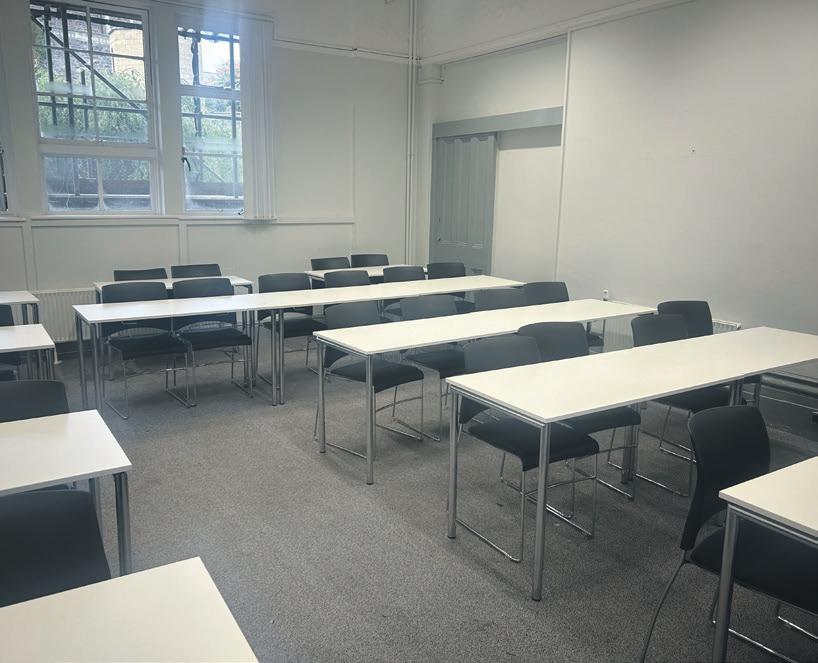
As pressures on students increase, are the endless o ers of oppurtunity becoming too much?
The University is scrapping Moves+. Harry Setterfield shares his view.
Harry Setterfield Fourth Year, Global Environmental Challenges
The University of Bristol ditched its Moves+ initiative at the end of the 2024/25 academic year. This is a step tracked in the wrong direction for environmental sustainability.
After a week of commuting to university by foot, either due to subpar public transport or the general walkability of Bristol, there’s not much better than indulging in a free co ee you feel you’ve earnt. This was the case for many of us at the University of Bristol. The Moves+ app produced an opportunity to bridge the gaps between physical, mental, and environmental health. Yet with the initiative being ditched, there seems to be a U-turn in community-engaged green measures by the university.
As I am sure many of you are aware, Moves+ was a fitness-reward app that incentivised ‘non-exercise’ activity –such as walking and cycling – with physical rewards. Points accumulated in the Moves+ app could be redeemed for rewards such as free co ee, yoga classes, and university merchandise. The scheme appeared to be held in high regard by students and sta alike, promoting active travel to and around the campus since its inception in 2019. Not only were we rewarded by the initiative, but the university itself has something to show for it. In 2023, the University of Bristol celebrated receiving a “sought after” Physical Activity Excellence Award, Moves+ named as a scheme helping its community get more active.
However, a long-overlooked characteristic of the app is the incentivisation of active travel on sustainability. By rewarding active travel, Moves+ steered both students and sta away from carbon demanding transport. And let’s be clear: promoting sustainability needs to continue if the university wants to hit its net zero target by 2050.
So why, despite the clear benefits of green-health initiatives, did Moves+ shut down on the 31st of May 2025?
The university stated their reasoning down to ‘on-going software issues that the app provider has been unable to address.’ However, the Apple App Store shows a review rating of 4.4 stars,
suggesting that whilst software issues may exist, they may not align with user experience. The awards and incentive of the system seem to outweigh the bugs and minor inconveniences of the app, suggesting that Bristol has missed the point – using glitches as an excuse to axe a popular scheme.
From the eight universities piloting this scheme in 2019, Bristol is alone in axing the app from its future strategies. The University of Warwick cut ties with Moves+ due to operational costs, dishing out £25,000 worth of rewards as part of the scheme. Whilst Bristol seems to have shyly withdrawn from the strategy, Warwick have capitalised on the benefits and popularity amongst those on campus, with plans to develop a university-owned alternative to maintain a fitness points-based reward system.
The climate-health interplay of Moves+ will leave a hole for the university to fill. How they do so is currently up in the air, but we – as a community – must ensure that there will be a return to an
“If our university is serious about net zero, it must stop backpedalling
initiative that is similarly inclusive and promotes physical activity alongside our mental and environmental health.
Moves+ may be gone for good, but if our university is serious about net zero and student wellbeing, it must stop backpedalling, and start rewarding every step again. We must continue to campaign and promote green measures on campus. Bristol should not care for awards nor accolades, yet reward us students, researchers, and sta on all the ‘steps’ we literally take to conserve our environment.
There are still good e orts towards promoting sustainability on campus. The Cabot Institute for the Environment and the Elizabeth Blackwell Institute for Health Research currently run a Climate Change and Health seminar series. These seminars look at the interplay between our physical, mental, and environmental health and are available to all sta and students. Our physical and mental health is intrinsically linked with our environment, and we must ensure our university continues to encompass these fundamental characteristics.








Have you had problems with your 'rentership'?

Editor ................................................... Sam Couriel






Join our Break the Mould campaign to hold landlords accountable
Deputy Editor .................................... Amelie Patel
Deputy Editor Lindsay Shimizu
Subeditor................................. Amaya Lewis-Patel
Subeditor Lilja Nassar







As pressures on students increase, are the endless o ers of oppurtunity becoming too much?
Caroline O'Beirne gives her personal guide on how to navigate the student-landlord relationship. Feel free to cut it out and stick it on your wall. Just dont use adhesives.
Caroline O'Beirne
Second year, Politics and Spanish
Are you unsure how to navigate the next steps of your relationship? Has it all gotten a bit awkward? Are you waiting days to hear their response, refreshing your Gmail every other minute?
No, I’m not talking about your latest situationship, I’m talking about the ‘rentership’ you have with your landlord.
There are many reasons why students struggle with their 'rentership': it could be a lack of communication, inflexible time frames or even a lack of confidence students may feel when dealing with housing issues; having to learn their rights and responsibilities with no experience beforehand.
Nonetheless, to help you navigate this process a little easier, Epigram has produced a simple guide to help you feel more prepared when navigating your rentership and all the other responsibilities that come with being a student renter.
1. Before contacting your landlord, you need to know your rights and responsibilities in depth
There are various responsibilities that,


by law, landlords have a duty to uphold. Guides like the Bristol Students’ Union’s handbook, ‘My Rent, My Rights’, provide excellent understanding of what you are owed as a tenant.
be able to cook anything to eat that night but it turns out the main switch had just been turned o . As you can imagine, we were very embarrassed.
you have spoken to your landlord in person or over the phone. Overall, we truly advise to keep things polite and friendly.
For example, landlords have a duty to provide safe and fire-resistant furniture, gas, and electrical appliances as well as ensuring there is a smoke alarm on every floor and ‘a carbon monoxide alarm in any room with a working fireplace or burning stove.’
2. The key to a successful 'rentership' concerns good communication – this can take many forms
This means reporting problems as soon as you can and providing as much detail
monoxide alarm in any room with a
At the same time, it takes two to tango. There are responsibilities that we as renters must uphold. For example, checking fire and smoke alarms work when we move into our new home.

Grace Rose delves into the best way to call out a friend’s innapropriate behaviour, without generating unbearable awkardness.
Grace Rose Second Year, English
In the first year of university, most of the student population are dropped o by their parents to a bounty of uncharted water: a foreign city, independent living, and most crucially a house or flat full of strangers that are in most cases our primary options for friends (or slightly forced acquaintances). As is told to us routinely in our early years, ‘you are not going to like or agree with everyone you meet in life,’ but how best can we go about manoeuvring awkward tensions when those you meet, live with or, even call a friend push the boundaries of appropriate social conduct?
day evening is perhaps not the best plan, as it won’t get checked till Monday morning if the agency is not open over the weekend. Of course, emergencies can happen in which case it’s important to contact your landlords immediately. For example, if you discover rats within the house, not only do you have to contact your landlords immediately, but also your local health authority. In our case, this is Bristol City Council.



being discussed, even







As a general rule, landlords are responsible for major repairs normally to do with the structure of the property: pipes, sinks, heating, toilets etc; according to an article by the organisation, ‘Save the Student’.

On the other hand, that might sound a little optimistic. In many cases, landlords and property managers may take days to get back to students and can provide inflexible time frames. One example of this is a student who told Epigram that her agency doesn’t even have an o ce in Bristol and when she was trying to pick up her keys, there was only one time slot she could do that. To her dismay, she was away at that time. Inflexible time frames are a common problem students face. According to one survey, 27 per cent of students complained that their landlords took over a week to fix various issues in their houses.




3. It is crucial to plan and stay organised









Overall, so long as you believe that you are doing the best you can to be professional and take responsibility, there is nothing to be worried about. If your landlord is not keeping up with their side of the bargain, it’s best to contact the university for advice. If you believe your landlord has acted illegally, contacting Citizens Advice or charities like Shelter is essential.

















Every house will be di erent – your responsibilities should be specified in your tenancy agreement, and once you have spent some time navigating the house and its quirks all will become second nature. A good example of this is when my flat first moved into our 2nd year house and after just one night, the stove stopped working. We called up our agency, upset we wouldn’t













This means keeping track of any payments which your landlords invoice you for and staying on top of any issues which have developed throughout the house i.e. dampness or even the invasion of pests.
When issues aise within your house, remember you are not alone. According to a survey of over 1000 students carried out by the organisation ‘Save the Student’, 31 per cent said they suffered from dampness in their house, 27 per cent said there were electrical faults and another 27 per cent said their house lacked proper water and heating.



4. Some advice on the best ways to contact your landlord

It is never comfortable, especially in the anxiety-inducing newness of first year, to call someone out for their offensive words or conduct, which is understandably why many remain silent, even when they are aware of injustice.
It is, however, vital to remember that the herd mentality of fear of reproach is why so many arrive at university with the notion that their o ensive, potentially harmful behaviours are socially acceptable. The collective ‘we’ must sometimes stick our necks out in order to (hopefully) educate the uninformed and protect someone else down the line from su ering at the hands of unchecked behaviours.
The first year of university involves meeting a large variety of people with an even larger variety of opinions. For me, many of these people would become my closest friends. There were, however, many occasions of late-night conversation and drunken musings that led to somewhat heated conversation
over the ethicality of words and actions. I was lucky in that most of my experience of politely calling out or even just opening up debate about dated views, homophobia, or misogyny, I was often backed up by others around me and met with willingness to understand. On the occasions when it was not, I was happy to make some temporary enemies on principle. It is possible to question someone’s social misstep without insult, aggression or, a complete writing o , and it is in fact these kinds of productive conversations that enlighten the unenlightened. No one wants to have their mind changed by someone who immediately goes for the jugular.

Leaving a voicemail on a Fri-


As pressures on students increase, are the endless o ers of oppurtunity becoming too much?
Learning to develop a good ‘rentership’ with your landlord might seem trivial when having to deal with such serious issues; especially if it is beginning to a ect your mental health. However, understanding what you can do to best help your own situation will not only best help your house, but also your confidence when dealing with adult issues.
same discussions for fear of ‘sensitive’ or ‘woke’ labelling. I cannot pretend to know entirely how all-encompassing this fear is to some men, though I can speak to my observations of my male friends who I have seen on numerous occasions get the act of ‘calling out’ right.
“telling your mate they have slipped up or o ended is part and parcel of any relationship based on respect
I can, however, recognise that my position is one of privilege as a woman not bound by some distorted notion of masculinity that inhibits so many men from calling out their counterparts in these
This being that it was done calmly, impersonally, and always from a place of mutual respect with an aim to inform rather than to attack; even sometimes in a jovial manner to dissipate tension while still conveying their point (when the subject matter allowed for joviality of course). In other cases it was done in private sidebars so as to depressurize
the discussion and allow for the most understanding to be reached without the convolution of multiple voices.
I maintain that, done right, telling your mate that they have slipped up or o ended is part and parcel of any relationship based on respect, and should always be met with a genuine intent to listen and correct or at least to listen without reproach. If your ‘boys’ are people that have no time for constructive criticism or who are downright bigots, then I would argue that these are not the best people to surround yourself with; as is true of friendships of all genders. Before coming to university, I may have been less inclined to make this argument steadfast, but after forming friendships with great men who have no time for toxic masculinity, I have seen that it is possible in groups of men to foster an environment that allows for calling out without consequence. I would encourage any reader to actively seek this out in their friendships also.
Sophie Lee Third Year, English
We’re coming up to that time in first term where the dreaded conversations about housing for next year start to weigh on our minds. Navigating the student housing market in university is something no one seems to prepare you for, and in Bristol it can be particularly di cult. This can be especially isolating when economic disparities divide friendship groups and we are forced to discuss financial circumstances with people we have only just met. Sophie Lee’s article tackles this topic head on, and I hope that it will be a rming to students who may find the search particularly challenging. It can often feel like everyone else has it already figured out, but I promise this is far from the truth. Having done this for three years now, I can attest that you will eventually find a place, and there's no need to panic or to rush into anything you are uncomfortable with!
You’ve finished your first month at university and you’re ready to start looking for a second-year house! It's with people that you’ve only really known for a couple of weeks but whilst the rental market can feel fun at times, navigating finding somewhere to live can reveal cracks in relationships, as the class divide at university becomes only too real.
A housing survey conducted by Bristol SU revealed that students not only have to deal with the typical issues of exploitative landlords and poor living conditions, but also rent increases are pricing many students out of reasonable accommodation. With the university lifestyle becoming ever more expensive, how are students navigating the twin issues of friendships and financials?
Around reading week, it can sud-
denly feel like every fresher is desperately trying to find people to live with. Some people get lucky and manage to find a group of flatmates, coursemates, or society friends to live with easily. But for others, it isn’t just a question of finding people to survive with, but ones that you’re going to enjoy living with for a year (or possibly more).
With Bristol being one of the most expensive cities in the UK for living, it can be di cult to find accommodation, and even more di cult to have the initial discussion about finances with potential flatmates. One student Epigram spoke to detailed how she initially wanted to live with her flatmates from first year halls, but quickly had to back out when she realised that the rent prices they were looking at were far too expensive for her. This can often a ect friendship dynamics
for the rest of the academic year, as this student went on to say that she felt excluded from her flatmates that had found a house together, as they began planning their decorations and move-in dates.
Some students have the privilege of being supported financially while at university, meaning their priorities when looking for housing are often proximity to campus and bedroom size. However, these students are often blind to the struggles of those that are less monetarily secure. With the rental market reaching a crisis in Bristol, often less well o students are forced to live further and further away. Not only does this have an impact on travel, which can often be a monetary burden (that
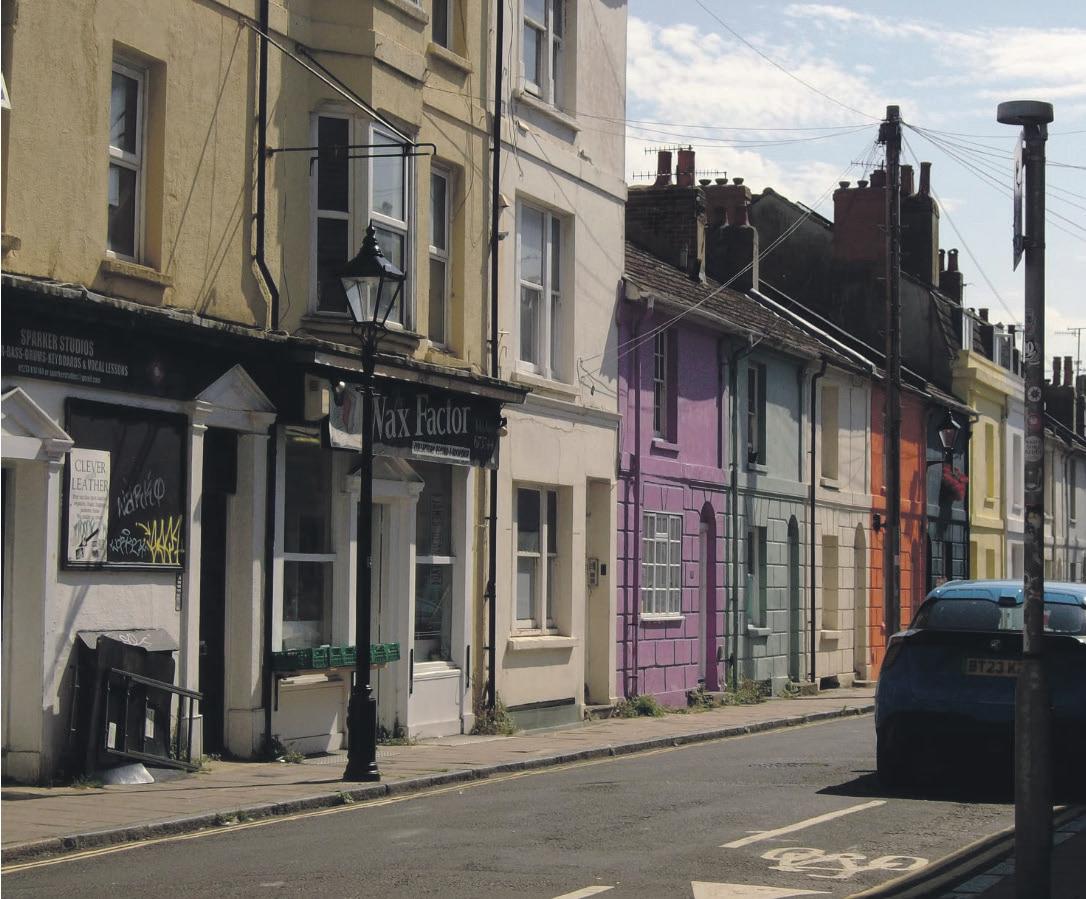

bus pass isn’t cheap…), but also it can a ect social lives. These students have less time to spend with friends before having to get home. Even after you’ve found a group of people to live with, the trouble can still sometimes continue and invade other areas of student life.
“
This student went on to say that she felt excluded from her flatmates that had found a house together, as they began planning their decorations and move-in dates

For wealthier students at university, it can be easy to forget that accommodation isn’t just a matter of finding somewhere to live. In 2024, 32 per cent of students reported paying between £601 and £700 per month on rent, excluding bills. 37 per cent of students have stated that the cost of their housing has had a ‘significant negative impact’ on their university experience. With more and more students being forced into parttime work to a ord living in the city they study in, more should be done about this rental crisis.
Outside of renting, money can lead to many di cult conversations. There are so many preconceived expectations of what the typical university experience should look like.
At Bristol this often includes things like: going to the Cheltenham races, going out every Wednesday night, sampling many of Bristol’s famous restaurants, and having pub nights with your mates. However, while socialising is obviously a key part of university life, so many of these options have financial implications, and can provide little to no support for students who want to take part, but lack the money to be able to. The university has
an Activity Hardship Fund, which allows students to apply for up to £200 per year to enable you to get involved with Bristol SU societies and activities, but these applications are highly competitive, and often do not even cover the initial costs a student is faced with. When societies such as Men’s Hockey and Women’s Rugby can charge over £250 for a year’s membership, many students are simply priced out of university societies. With the university constantly pushing students to join societies, the question arises of how they can justify encouraging students to join societies that they cannot a ord, while barely managing to cover basic living expenses? Working-class students are consistently allowed fewer opportunities, impacting all aspects of their university experience.
So where do we go from here? Economic di erences between friends can often lead to di culties not only in renting and finding post-first year accommodation, but can also bleed into all aspects of student life. Despite university initially seeming like a level playing field, cities such as Bristol create an economic conundrum for working-class students, as people often have to pick between having a social life they can’t a ord, or spending all their free time working. Perhaps, it is time to call on the university to provide more support for financially compromised students, ensuring that everyone can enjoy their university experience, regardless of background.
If you’ve been a ected by any of the issues raised in this article, feel free to use any of the contacts listed below: Call the Samaritans for free health and wellbeing advice; check out the university pages for financial hardship advice; contact your local council for help with the cost of living.
Editor .............................................. Anna Dodd
Deputy Editor Ellie Barnes
Deputy Editor ........................ Charlotte Kerby
Subeditor....................................... Maya Tailor
Subeditor Hannah Corcoran
actually happens

in second year, you finally feel comfortable in your university city, you have a secure friend group and you’re ready to seize the year. What better way to celebrate your return than to throw a big, busy house party?
Many students get caught out by noise complaints at the start of the first semester. Between 2020 and 2025, 2,451 noise complaints were made about University of Bristol students, with 375 of these resulting in disciplinary action. The police will show up to discuss the situation with a resident, before reporting back to the university. The residents of the house will attend a meeting at the Community Liaison O ce for an investigation, and they will be provided with advice on how to reduce noise and the risk of noise complaints. More serious behaviour may result in more formal action.
The university’s policy regarding noise complaints is somewhat confusing to students. What really is going on? The first ambiguity lies in the university’s involvement in private accommodation, despite private housing not being student accommodation, i.e. student halls. The university works with the police to ensure that disruptive behaviour is resolved instantly. Student areas such as Chandos Road, Hampton Road, Redland Grove, Trelawney Road and others are patrolled on certain days of the week on which students typically make more noise – Wednesdays, Fridays and Saturdays. This plan is named ‘Operation Beech’, into which £25,000 was funded when it was established in 2019. Neighbours can text the address from which the disturbance arises to the number found online, to which the police will respond on a priority basis.
“
In a survey of 20 students conducted by Epigram, 50 per cent per cent of respondents said that they have received a noise complaint whilst at university, 90 per cent of them being in second year when they received it, and 10 per cent in third year.

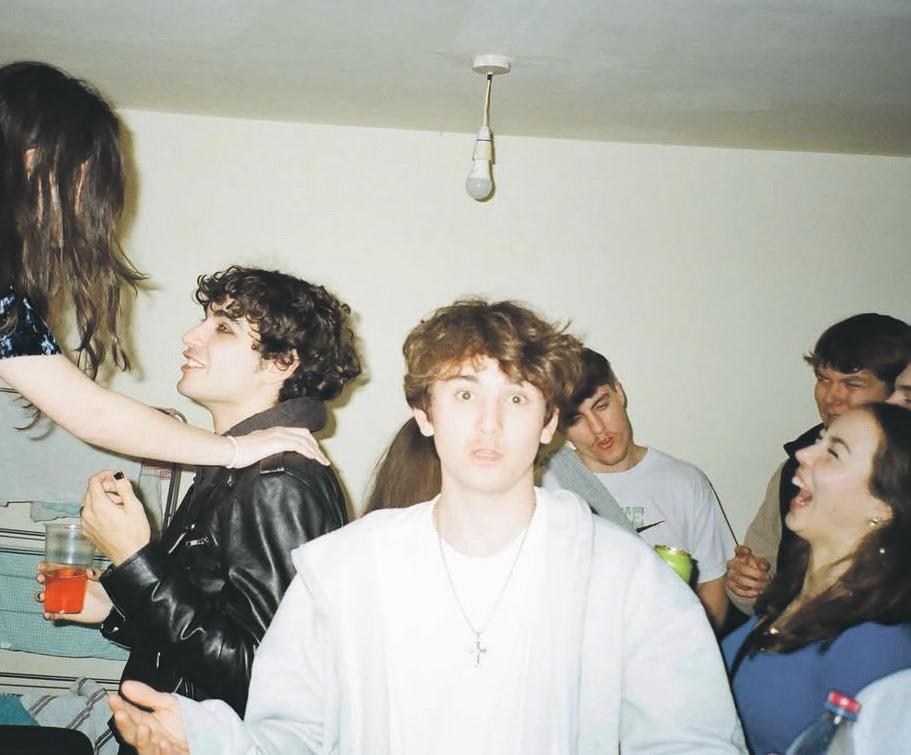
bours. 66.7 per cent of respondents said that they attended an investigative meeting with the Community Liaison O ce. Interviewee, ‘L’ felt that the meeting was ‘just a formality…to tick a box’.
81.8 per cent of respondents of Epigram’s survey said that they did not think that the noise complaint was reasonable. This could be due to the party being louder
90 per cent of respondents claim that they do not feel that their rights are clear when it comes to house party complaints and fines at the University of Bristol
Annex two of the Student Disciplinary Regulations (applicable to all registered students) outlines the ‘Local Rules and Regulations for Misconduct in University Residences and the Community’. A2.1 specifies the university may investigate ‘excessive noise or gatherings that cause a disturbance to members of the local community’, as well as other examples of behaviour which may harm neigh-
than the students expected, or that they did not think that it was ‘disturbing’ or ‘excessive’. L said that she ‘would have appreciated it if the neighbour had spoken to us first’ before the police turned up, ‘as it was a Saturday at about 12 am’. She also said that she thought the police were there ‘to scare us into stopping. They didn’t say anything of importance.’
A2.2 outlines the Disciplinary Procedure, leaving the Senior Residential Wellbeing
Manager the competence to make decisions regarding guilt and penalty. A2.3 outlines the potential penalties the students may be subject to, including sanctions. For some, the most daunting penalty is a fine: it will not exceed £250, bar where the behaviour is ‘likely to cause injury or impair safety on university premises’ – in which case the fine could be up to £400. The fines collected fund Operation Beech. A2.4 provides information on how to appeal the decision.
Another ambiguity lies in when this fine will be imposed. The Regulations note that ‘consideration will be given to the seriousness and circumstances of the misconduct, the Responding Student’s means and any other mitigating circumstances raised by the Responding Student or their representative.’
The university lacks legal powers to deal with complaints on a much larger scale. Contrastingly, the Bristol City Council Neighbourhood Enforcement Team can deal with persistent noise problems. Legal private nuisance usually involves repeated behaviour, and an Anti-Social Behaviour Order is only likely to be issued if noise is persistent. For this reason, Bristol Council asks that a complainant fills a ‘14 day noise diary’ before making the complaints.
Zero per cent of our survey’s respondents said that they received a fine from
the university, but some said that they received a warning. This may not be a representative percentage for such a big university, and other online sources suggest that in the past, many students have been fined. Whilst the situation may have changed, this percentage suggests that it is di cult for the o ce to determine the severity of a situation. L said that she has never met anyone who has been fined after a one-o noise complaint. It is possible that the o ce refrains from fining students for a oneo complaint, as many parties end up bigger than planned, and the sensitivity of surrounding neighbours is not linear. These potential ambiguities lead 90 per cent of respondents to claim that they do not feel that their rights are clear when it comes to house party complaints and fines at the University of Bristol. L, however, said that she thought that the meeting was helpful to know what fines may be imposed next time.
A one-o noise complaint and its investigation by the university may thus largely be a warning and a way of calming down excited returners, delighted to have their own houses within real communities. No longer protected by the isolation of student halls from the rest of society, they have to be shocked into reality. One day, it will be them being rudely awakened by Fred Again and Groove Armada a few doors down Chandos Road.
‘I
Zenobia Motl speaks to students about the highs and lows of securing internships, the success of which can be significantly impacted by class divides.
Zenobia Motl
First Year, English
Just in time for the mania of internship application season, Epigram interviewed a handful of University of Bristol students, from ranging cultural and economic backgrounds to gauge the e ect of class and how it shapes their chances of finding and landing internships, forcing us to ask the question: is the elitist nature of universities carried into certain fields of work?
According to research from The Sutton Trust, 36 per cent of working-class graduates report doing an internship, in comparison to 55 per cent of middle class graduates, which is an eight per cent increase from 2018 - displaying the ever widening class gap in certain fields of work. Internships are a key experience and are often crucial for opening doors into certain professions. However, many
working-class students are discouraged from even attempting to apply, unpaid internships often leave people in a worse place financially, locking less well o students out from certain careers and fields.
With the arrival of autumn and the rush of internship applications, Tyler, a student from a privileged background, reflected on the pressures experienced even by those who have assistance in the application process, access to extensive financial networks and the privilege of a ording an unpaid internship. Tyler told Epigram that he is currently applying for positions at firms including Morgan Stanley, JP Morgan and Blackstone. With guidance from his ‘finance bro’ uncle, he expects the process to be relatively straight forward. ‘He’ll read through my CV and tweak where needed and advise me on how to shape interviews and individual applications for each company,’ Tyler explained, giving him the best possible chance of securing an opportunity. These industry connections can be vital in shaping students’ future career paths. Tyler noted that while he feels little stress about the process, his confidence remains modest, ‘out of ten in confidence I would say around a five. Nothing is ever guaranteed but there's no reason to be stressed, I have a backup plan and a backup backup plan.’
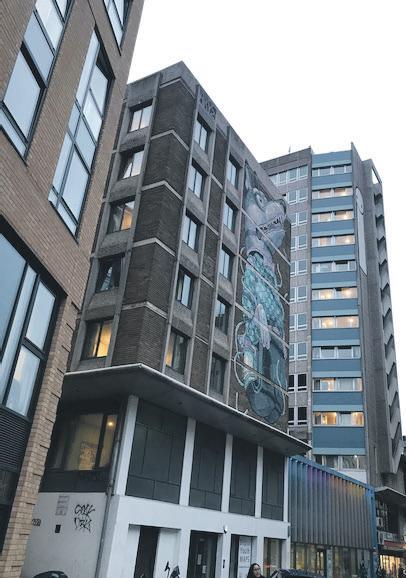
“
ry of being so blase about something so essential simply isn't an option.
For some students, internships are completely out of reach. The Sutton trust reports that one in five internships o er no financial compensation at all and many more fail to meet minimum wage. This creates a barrier, forcing many students out of core career building opportunities that others can easily access and are seen as essential to their careers. A lot of these students become hopeless, whilst wealthier peers are able to lean on those around them for support and accept unpaid work. According to The Sutton Trust 40 per cent of unpaid interns rely on money from their parents to fund working for free, something that is simply not accessible for everyone.

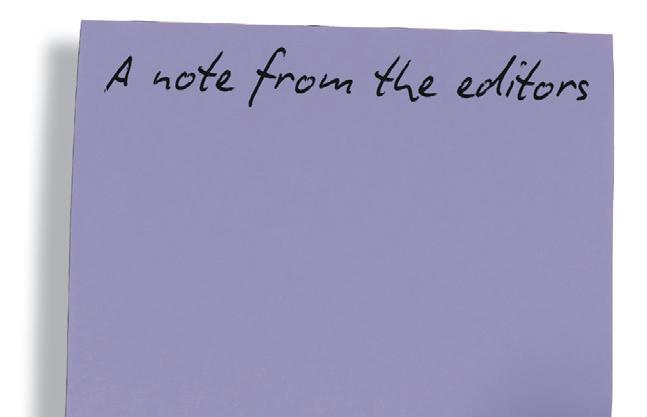
Our November issue focuses on an issue that becomes more apparent than ever at this time of year. The search for internships is incredibly stressful and we have chosen a piece which investigates the socioeconomic dynamic of finding internships, and how industry connections and class may a ect the search. We hope this piece sheds some light on competitive internship culture at university but also puts our readers at ease.
But for many students from less privileged backgrounds, this kind of calm-confidence feels impossible. Internships often act as stepping stones into these industries, allowing them to gain workplace experience, develop skills for employment and make vital professional networks that are key in competitive fields. For many the luxu-


to simply fit in at university.



Tessa spoke about the challenges of
what’s the point of putting in so much work if someone with industry connections can just come in and snatch up a position I’m more qualified for?
not being able to a ord an unpaid internship, ‘it makes it so di cult, I can't a ord to just work for free, but there are so many positions that could potentially change my life, that don't pay, and I just can't a ord to take them’. Many students share this point of view. Tessa also explained the social isolation it can bring - ‘it’s harsh to see other people who are able to do the things you can't, even when you have to work twice as hard for less’. Tessa explained how she often feels she must ‘put on a front’ to seem confident when competing for positions and
This kind of ‘imposter syndrome’ can lead to students setting highly unrealistic expectations for themselves whilst feeling they are destined to fail at what they set out to do. For some students, like Tessa, it has made them question the value of their course or even if university itself is worth it. ‘I honestly feel like sometimes you shouldn't bother’ she admitted ‘what's the point of putting in so much work if someone with industry connections can just come in and snatch up a position I'm more qualified for? God that makes me sound so jealous.’
For some, the idea that university might not be worth it seems unthinkable, but it's a real doubt faced by students like Tessa. Forced to turn down opportunities just to a ord their education and fear they will leave university without a foothold in their chosen field, students like Tessa are often shut out by the elitist structures that dominate industries such as finance.
As internship season comes and goes, it becomes clear that opportunity is far from equal, and for many students hard work simply isn't enough. Sadly, with the ever widening gap between working-class students and their middle class peers, internships are no longer opportunities open to all, but privileges reserved for the few that can a ord them.
This month, we interviewed Salsa Society, who provide weekly Latin American dance classes for students and sta at the University of Bristol. Open to dancers of all levels and experience, Salsa Society is committed to providing an inclusive and welcoming space where students can express themselves freely and develop their dance technique. Here's what the society themselves told us about their classes and performances this year:
Can you give our readers a brief description of what Salsa Society is all about?
We are a lively and welcoming society passionate about Latin dance and music! Salsa Society o ers weekly Salsa and Bachata classes for all levels. This means that whether you’re stepping onto the dance floor for the first time or are a seasoned dancer already, we are waiting for you to join!
What do you love most about Salsa Society classes?
More than just learning to dance, salsa has brought me a huge sense of community, acceptance, and confidence. Before joining, I used to be afraid of dancing or performing in front of people. Even just talking to strangers felt intimidating. Because our classes rotate partners every minute or so, you quickly get used to talking to and connecting with everyone in the room. It really helps develop social skills and meet people you might never have spoken to otherwise.
You teach regular Salsa and Bachata classes. Could you explain the di erence between the two, and who might enjoy which style?
Salsa is fast-paced, upbeat, and full of spins, turns and lively percussive rhythms. It’s per-
1
Annabel Bienfait Community Editor
fect for anyone who loves energetic music and a vibrant, animated atmosphere. Salsa can be danced in di erent ways, each with its own flair, such as Cuban, crossbody or Cali styles. It is also common to dance salsa solo, especially during shines or warm-ups, which makes it great for developing individual style and confidence.
Bachata, on the other hand, has a smoother and more relaxed feel, which can make it easier to pick up for completely new dancers. We mainly teach bachata moderna, which blends the playful footwork of traditional Dominican bachata with the smooth, flowing movements of sensual style bachata. It’s fun, expressive and very musical. It lets dancers really connect with both the music and their partners.
Do you have any favourite memories of classes or performances with Salsa Society?
One of my favourite memories has to be our Halloween class last year. Seeing everyone dressed up and dancing in costume was hilarious. We even had a little costume competition, with prizes for the best looks! Being part of the performance team also brought so many great memories. I’ll never forget the early morning rehearsals, the last-minute practices and going for co ee or to the pub afterwards. All those moments are what really brought us together.
Shake up your study space
We all have our favourite study spaces, but sometimes it can get dull sitting in the same spot day in, day out.
A change of location can do wonders for your productivity levels, and thankfully, Bristol isn’t short of study spaces. An underrated space on campus is the Hawthorns; Bristol veterans may remember it as once being student accommodation, but it's now a cosy study space perfect for both group and solo work. For those wanting to escape campus, Bristol Central Library is worth a visit - a historic library with stunning views to distract you from your essay. Finally, don’t forget that you’re not limited to your subject’s library. Why not visit another department’s study space, such as the Physics Library, Queen’s Building, or Grace Reeves!
Editor Annabel Bienfait
Deputy Editor ................................ Rachel Shortall
Deputy Editor .....................................
Subeditor

2 Eat Well

Salsa: Every Wednesday in the Carpenter Room, Richmond Building Beginners @ 19:00-20:00
Improvers @ 20:00-21:00
£3.50 for members, £5 for non-members
Bachata: Every Thursday in Studio 3, Indoor Sports Centre
Beginners @ 18:00-19:00
Improvers @ 19:00-20:00
£3.50 for members, £5 for non-members
Saturday Specials: Held twice a month, exploring other dance styles such as samba, tango, forró, cha-cha, kizomba.
Salsa Fiesta: The biggest event of the year! Held every year in TB2, it's a formal ball with catering, dance workshops, and performances from our teams and special guests.
Membership Cost
£20 for the year
Gives access to discounted weekly class tickets, and discounted entre to socials and events
Contact:
Instagram: @ubsalsasoc Email: ubsalsasoc@gmail.com
Read the full article at epigram.org.uk
Tempting as it may be to tuck into yet another Uber Eats delivery or Sainsbury’s meal deal, your brain needs nutritious fuel in order to keep pushing through deadlines. The best way to get this is with a home cooked meal packed with natural ingredients. If you’re needing to stock up on fruit and veg, there are plenty of independent greengrocers where you can pick up supplies; check out Reg The Veg in Clifton Village or Full Basket near the Arches on Cheltenham road. If studying has you knackered and you simply cannot cook, Eat a Pitta is the perfect healthy alternative to fast food, serving a range of tasty food, most combining houmous and falafel. With locations spread across Bristol, you’re likely not too far from one.
3




Subeditor.............................. Alannah Mylechreest






‘I’m an outsider in my flat, they all hang out together without inviting me, and I get aired in the group chat.’
I have a friend whose mantra is ‘stop, drop, and roll’. Stop putting e ort in, drop them and move on. In all seriousness, maybe they are just not your people, which does happen sometimes. You are going to have to keep trying as these people are in your flat, but you will find your people. Maybe look in your academic society and go to their socials or find a non-academic society to join and see when their next social is and meet some new people!
‘My parents won’t stop bugging me about getting a grad job! Help me please!’
Personally, I am going to stay outside of work forever – just isn’t for me. However, for you, the careers site is useful, and they have loads of di erent resources you can try out. Depending on your course, you can speak to sta and see if they can signpost you to any useful sources, or even if they can connect you to specific people. It is also always good to do some volunteering if you haven’t had any internships, again you can find them online on the careers site. Sadly, it is going to be tricky finding a grad job, but if you keep trying and looking on every site possible you might find something you like!
‘I think I fancy the [redacted] editor! What should I do?!’
Wow. I’ve heard the person who writes the Agony Aunt section is hot too (just rumours). In the spirit of openness, you could either a) tell them, or b) do an extravagant fox chase by leaving clues in Epigram... Then at a Christmas get-together you could reveal all?
It’s no secret that getting some exercise whilst surrounded by nature is good for both your physical and mental wellbeing. Any pain caused by being hunched over notes flashcards or staring at a computer screen for hours can be soothed by one of the many walks found in Bristol and its surrounding areas. On the south side of the river is Ashton Court Estate, boasting the beautiful grounds of a manor house (and an excellent cafe too!). For those looking for a bit more nature, Snu Mills is an excellent walk along the River Frome. And if a bit of animal therapy would help take your mind o of essay stress, then Goats in the Gully is highly recommended, and does exactly what it says on the tin - goats in the gully found on the edge of the Downs!
This year, we are relaunching ‘Epitome’: the go-to guide of Bristol's best events, student deals, and nights out. From club nights to craft fairs, we aim to help you discover the best of Bristol each month. Get in touch if you have an unmissable event you want to share with our readers.












Zed Law & Jed Dixon Epitome Curators


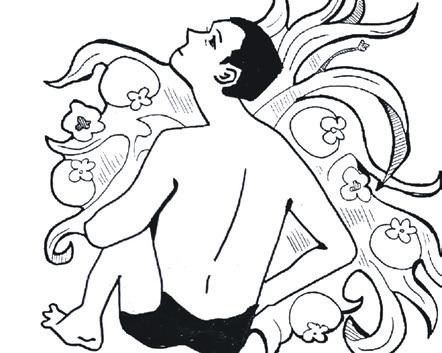








Halloween: Lula Kali (Mr Wolfs, Old City, £4) 1/11

(L'Étoile Studio, £20) 1/11



Location: Ashton Court Estate
Location: The Mount Without

Date: 5/11
Location: Multi-venue
Date: 11/11

Price: £18
Price: £10
Date: 14/11 - 16/11
Price: £7 per showing

Lula Kali touches down in Bristol for an evening of multilingual neo-soul at Bristol’s iconic jazz bar Mr Wolfs. Stay late for an inevitably spooky DJ set!
The Cult of the Dead: Ancestors Masks Clay Class
Discover global ancestral traditions and craft a personalised clay mask in this engaging and rewarding Halloween night. No experience required and all materials included in the ticket cost.
The Long Heat w/ Andreas Malm and Wim Carton
(Bookhaus, Wapping Wharf, £7) 3/11
Geo-engineering has been regularly touted as a ‘get out of jail free’ key to escape the ongoing climate emergency. But what if this is just a pipe dream- and how do we respond if so? Join Andreas and Wim for a discussion on their latest book discussing this and moretickets o er £5 o their book and a glass of wine.
Paddang + Bubblegum Hypnosis (The Lanes, free) 4/11
Psychedelic rock group Paddang return to conventional touring following an expansive period of









Celebrate bonfire night in style with three stages of live music in the stunning backdrop of Ashton Court Estate. Local favourites (including folk darling Nile Robinson and feral indie-psych outfit Humdrum) make up the majority of the confirmed line-up with the rest TBC. The panoramic view from the estate means you won’t miss any of the citywide firework displays!








A solo, four-character tour de force of contemporary dance lands in Bristol for its first o ering. Performed and choreographed by National Dance Awards 2025 nominee, Kennedy Junior Muntanga, the piece explores themes of fractured memory and identity through narrative storytelling.
The biggest African film celebration in the south west returns for its 20th instalment. A multivenue event taking place throughout the weekend brings a variety of films and experts for Q&As at an a ordable price. Highlights include moving queer love story Rafiki, and Rhodesian anti-colonial fighting epic Flame - where both the director and lead actor are available for questions!

festival and club sets. Well-practiced



performers bring their post-
to the Lanes- check out their track ‘Pressure’ for a taste!
Downend Round Table Fireworks (King George V Playing Fields, Downend, £11) 7/10
One of Bristol’s biggest charity firework displays returns in style. The show is entirely set to music, with a large bonfire, and food stalls surrounding the site. Catch the 48x bus from the centre for a stressfree journey (it’s a bit of a trek otherwise!)
Kelvin 373 Presents Boiling Point (Clock Factory, £5+) 8/11
Kelvin 373 is back at Clock Factory with Boiling Point again, with the bpm progressing throughout the night. High energy in Clock Factory’s 360° setup, all for an a ordable price.
Chartreuse + Moreish Idols (The Lanes, free) 10/11
Chartreuse bring their ethereal and emotive indie-folk to The Lanes following the release of their album Bless You & Be Well. Joined ably by psych folk Moreish Idols, this is a great evening for the lyrically minded.
The Knights of Magic (Red Lodge, Park Row, £15) 14/11
A biannual convening of the most talented magicians in the south west return to Bristol for a showcase of new tricks and illusions.
Frankenstein: The Musical! (Loco Klub, Temple Meads, £10) 14/11
A fabulous clash of generational popular music and classic gothic horror might be the show you never knew you needed. Expect reworked lyrics from AC/DC, Broadway, Bruno Mars, and more- there’ll be something for everyone.
AM: Djrum b2b Skee Mask, Shy One, Covco, Beau Wanzer, Ossia, Pessimist
(Strange Brew & The Island, £22.50) 15/11
Bristol record label Accidental Meetings presents a massive night of bass with dub, grime, techno, and pretty much anything else you could imagine. With two venues and music until 6am, this night has everything you need.
15 Years Of Jungle Cakes Records (Lakota, Stokes Croft, £16+) 15/11 Three rooms of top shelf jungle and beyond from an absolutely unmissable lineup. Enough said.
16th November onwards
Shame
(Electric Bristol, £20) 17/11
Post-punk darlings Shame arrive in Electric for a super-charged set touring their new album ‘Cutthroat’. Experimenting with a blend of
A beautiful neighbouring university city (£6 Bus)
deer parklands and mansion (Free- walk over
newer electronic sound and their classic hedonistic guitar ri s, this is not to be missed.
Contact Hours Screening + Q&A (Winston Theatre, Richmond Building, free) 19/11
Contact Hours (2024) is one of the essential short films of the year: an impactful and a ecting portrayal of a student suicide. The filmmakers will join the audience along with mental health experts for a safe and open discussion surrounding suicide prevention.
The Orchestra (For Now) (Exchange, Old Market Street, £12) 20/11
Rapidly rising feral seven-piece prog-rock outfit The Orchestra (For Now) return to Bristol following a triumphant set at Dot2Dot. Expect cello-infused anthemic songs led by a very able (and continually vaping) lead singer. Check out their EP ‘Plan 75’ for a taste!
Bob Vylan
(Prospect Building, Temple Meads, £32) 20/11
The most notorious punk group around. Join Bobby and Bobbie in the Prospect Building for a blend of razor-sharp rap, waves of crowd surfers, and political activism as they continue their meteoric ‘We Won’t Go Quietly’ tour.
From A Buick 6 play Bob Dylan (The Croft, Stokes Croft, £20) 22/11
Experience an afternoon of every era of Bob Dylan. Shared vocal Bath


A beautiful neighbouring university city (£6 Bus)
duties go to Mike Crawford and Emily Breeze, o ering a Baez-esque additional twist to the timeless songs.
Gros Couer + Jakabol (The Lanes, free) 25/11
Gros Couer bring their practiced energetic psychedelia to The Lanes with support from Bristol locals Jakabol. Not to be missed for progrock/psych fans.
Club zer0: Sim0ne, Ross from Friends Presents Bubble Love & Gia
(The Underground, Broadmead, £8+) 29/11
Part of the venue’s a ordable nights out e ort, this night gives you the chance to experience the unmissable Underground on the cheap before it closes at the end of the year.

Fourth Year MSci Physics and Philosophy Photos
Editor Ella Heathcote
Deputy Editor .................................... Grace Knight
Deputy Editor Amelia McCabe
Subeditor.................................. Tylah Hendrickson
Subeditor............................................... Eloise Nicol

Matthews explores the world of comics, giving recommendations for students who need something quick and accessible to entertain them alongisde uni work.
Lauren Matthews
What do you think of when someone mentions comic books? Goofy heroes in spandex and underwear? Children’s cartoons? Arguments over the exact shape of Batman’s cape? The world of comic books is often overlooked as too childish, nerdy or just inaccessible. In reality, this medium is just as capable of complex and diverse storytelling as any other.
“Storytelling in a way that can’t be captured by words alone
As a fourth year university student, so much of my energy is taken up by lectures and coursework that, like so many others, I don't read half as many books I used to. Dense text doesn’t feel as accessible after a day of deciphering heavy papers or staring at a computer screen. Luckily, this hasn’t stopped me from reading great stories! Collected into a graphic novel or monthly released single issues, the 20-30 page comic's bite-sized narrative chunks allow you
Epigram's comic picks:

to get wrapped up in a di erent world and finish in time for the next lecture.
I read my first comic in secondary school, after my obsession with the Marvel movies led me to pick up a famous run of Hawkeye comics. I was immediately hooked. Over the years, I picked up the odd title here and there but nothing really lived up to the excitement of discovering Matt Fraction’s writing and David Aja’s stunning art.
The real turning point came with Ram V and Filipe Andrade’s The Many Deaths of Laila Starr, an indie comic, in which Death faces unemployment after the birth of a baby that will grow up to invent immortality on earth. A beautiful and layered story tackling our relationships with death and mortality and the line between the two. With all of its magnificent writing wrapped up in gorgeously illustrated scenes of Mumbai in dreamy pastel tones. It's storytelling in a way that can’t be captured by words alone.
While superheroes dominate the comic industry, with Marvel and DC being two of the biggest publishing houses, there’s a whole world of incredible indie publishers, writers and artists creating incredible artworks of all genres. From introspective memoirs like It's Lonely at the Centre of the Earth (Zoe Thorogood) or Persepolis (Marjane Satrapi), to award winning horror Something is Killing the Children (James Tynion IV), to sci-fi fantasy epic Saga (Brian K Vaughn), there is a graphic novel for everyone. Even comics centred around superheroes range from classic capers to intelligent character work to high-concept masterpieces. There’s also no need to worry about starting points or past continuity with almost all indie works. Even characters that


are part of huge universes, like the Marvel or DC heroes, will have plenty of one-o stories perfect for new readers.
If you’re unsure where to start with a series or how to find the best stories for you, visit your local comic book store! Holding physical copies and looking at the huge range of art styles is a great way
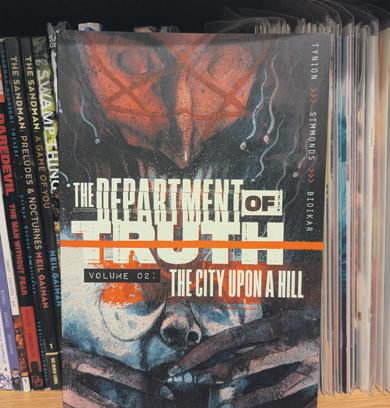
to find which comics resonates with you. Most importantly, talking to the employees at stores like Forbidden Planet or Excelsior is the best way to find something truly tailored to your interests. The sta are always friendly and excited to talk about the comics they're passionate about. Both of these stores o er student discounts, helping to make things even
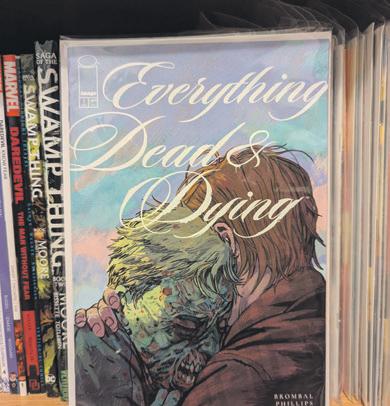
more accessible. If you’re worried about your student budget, you can also find great deals buying graphic novels second hand or trying those in the DC compacts range. These are smaller, softcover editions of classic stories for only £8.99. Below are some receommendations for people starting out in the graphic novel scene.

Kashvi Cox gives an overview of Bristol's collaborative creative societies, providing the costs of memberships and details of their socials.
At the University of Bristol there are over 400 clubs and societies for students to join. An overwhelming majority of these are sports-based, but if you are like me and enjoy doing something a little more creative (and sedentary!) there are plenty of options out there. Allow me to guide you through a few of the craft societies Bristol has to o er
First up we have the Art Society. This group o ers members a chance to get creative, to meet like-minded people, and to try something new. The society caters for all levels; whether you haven’t picked up a paintbrush since primary school, or you are looking for a platform to exhibit your artwork. They run two weekly life drawing classes, ‘drink n’ draw’ sessions, technique workshops, and so much more.
Epigram reviews the new musical adaptation of David Nicholls’ seminal ‘Starter for Ten’ at the Bristol Old Vic
Tom Cadley
Membership costs £20.
Now this isn’t strictly a craft society, but baking is certainly creative. If you love to watch the Bake-O or are just a fan of a sweet treat (who isn’t?) then this might be one for you. The society hosts ‘bring your own bake’ sessions, where members can taste test others’ creations, and cake decorating classes. They also stage their very own Great Bristol Uni Bake O . The membership is just £3, allowing members free and discounted tickets to certain events.
Whether you are a keen photographer, or just enjoy snapping a few photos on your phone, then this society has you covered. The £5 membership grants access to paid work opportunities, member-only competitions, and social events with food!
This fun, chatty, creative society runs weekly ‘knit and natter’ sessions for members. It is the perfect place to learn a new skill and great if you want to add some homemade garments to your wardrobe. If you have never
picked up a hook, needle, or a piece of yarn before, then don’t fear– the committee is there to guide you through the basics. The society also runs bigger projects. In the past they have knitted hats for the homeless in support of the Bristol University Homelessness charity. Memberships vary in price from £2 up to £6.
The origami society is open to students of all levels, from beginners to seasoned origami enthusiasts. They run weekly sessions, giving members a chance to unwind, listen to music, and create something beautiful.
The annual membership costs £3, entitling access to free lessons and the materials needed.
This student group provides a platform for writers to explore their creativity through weekly workshops and discussions. The regularity helps members get into a writing routine and allows them to get to know fellow writers.
The society also hosts open mic nights, a great place for members to share their work in a fun and supportive environment, and to gain confidence in performing. Annual membership is £3.



As the curtain rises on Starter for Ten at the Bristol Old Vic and the cast belts out ‘University Challenge’ again and again, an unsuspecting audience member couldn’t be blamed for fearing that this new musical is just another screento-stage adaptation of a beloved noughties film hoping to cash in on nostalgia and local interest. However, Starter for


take on David Nicholls’ 2003 novel.
The story follows Brian (Adam Bregman), a bright-eyed first-year English student at the University of Bristol of 1985, as he chases both his childhood dream of appearing on the TV quiz show University Challenge and his ill-advised crush on posh
teammate Alice (Imogen Craig).
This is the second time this
production has premiered at the Bristol Old Vic, with the updated version streamlining the show into a slicker and even more charming evening, with a new cast and rearranged score.





The show maintains high energy throughout, picking up in the second act as the Bristol team fight to stay in the competition in the thrilling 11 o’clock number ‘The Final Round’. This spirit is sustained by a sharply-written book and lyrics that are repeatedly laugh-out-loud funny, complete with British-isms and 80s references.
cle Chance as Lucy, whose powerful voice brought the house down in the Act 1 finale. Mel Giedroyc’s return to the production grounds it in familiarity, sincerity and humour, and she lights up the stage both as Irene and as infamous quizzer Julia Bland.






This makes the more touching moments in the show, particularly when Brian re-evaluates his relationship with his mum Irene (Mel Giedroyc) following the death of his dad in his childhood, particularly moving.
One plot point that di ers from both the novel and film is to have Alice force Brian to hear the answer that would result in his inadvertently cheating when the Bristol University Challenge team is close to victory. In the original story, Brian chooses to read the questions of his own accord before the competition begins, so this change removes responsibility from Brian for his mistake and further villainises Alice.

childhood, particularly moving.
Performance highlights include Will Jennings as the campy team captain Patrick and Mira-
This new musical likely has a bright future ahead of it, so University of Bristol students shouldn’t miss the chance to see Starter for Ten while it is still local to them.
Columnists .................. Alexandra Boersma & Ruby Wright
Editor Ella Heathcote
Deputy Editor .................................... Grace Knight
Deputy Editor Amelia McCabe
Subeditor Tylah Hendrickson
Subeditor............................................... Eloise Nicol

Literature columnist
Alex Boersma interviews author, journalist and teacher, Dr Lily Dunn on her inspiration behind her recently published novel.
Alex Boersma Literature Columnist
Prior to Gloucester Road bookshop’s event celebrating her new book: Into Being: The radical craft of memoir and its power to transform, I interviewed author, journalist and teacher Dr Lily Dunn. The evening’s conversation alongside fellow memoirist Marianne Brooker’s questions followed Dunn’s journalistic past, a nity with memoir, and its power to heal and transform alongside her advice to budding writers.
“ Act
as though the journal is what a sketchbook is to an artist
Dr Lily Dunn is a writer, editor and teacher at Bath Spa university. Her last novel, Sins of my Father: A Daughter, a cult, a wild unravelling won nonfiction book of the year for The Guardian in 2022. She co founded the London Lit Lab at Birkbeck university in London where she teaches creative writing. Her specialisms include memoirs, personal essays and narrative nonfiction.
Dunn’s writing career began in journalism, writing for Time Out in her twenties, editing Kids Out and eventually becoming Books Editor. She then freelanced for You Magazine in The Daily Mail with a column about relationships and later as a copy writer before pursuing her love of novel writing.
Her biggest tip for those of us thinking of pursuing a career in journalism is to start keeping a journal to write in everyday and to act as if ‘the journal is what a sketchbook is to an artist.’
She described this as the best way to identify and grow your personal writing voice and if writing memoir, develop a reflective voice. She argues ‘knowing your writing voice as a writer is essential.’ She also stresses the importance of identifying and engaging with your interests as they are unique to you. As obvious as it sounds, she explains the importance of just sitting down and writing, even when you don’t feel up to it and don’t know what to write, just write.
She explained how her published writing is in depth and perfected as it goes through di erent editorial stages, while her Substack writing is more conversational, like a ‘live notebook’ in which she can communicate with her followers. She explains her love of Substack for its community base and urges all writers to join a writers group either on Substack or elsewhere.
On her website, Dunn explains ‘I don’t shy away from di cult subject matter and have written about the experience of being the child of a cult member, about intimacy in the age of polyamory, about the impact of sexual abuse and grooming on the teenage girl.’ We talked about the importance of having a support system of people who will comfort and listen to you when emotions inevitably surface in memoir writing. She also expressed something I found very insightful; the importance of identifying why certain emotions are coming up. It
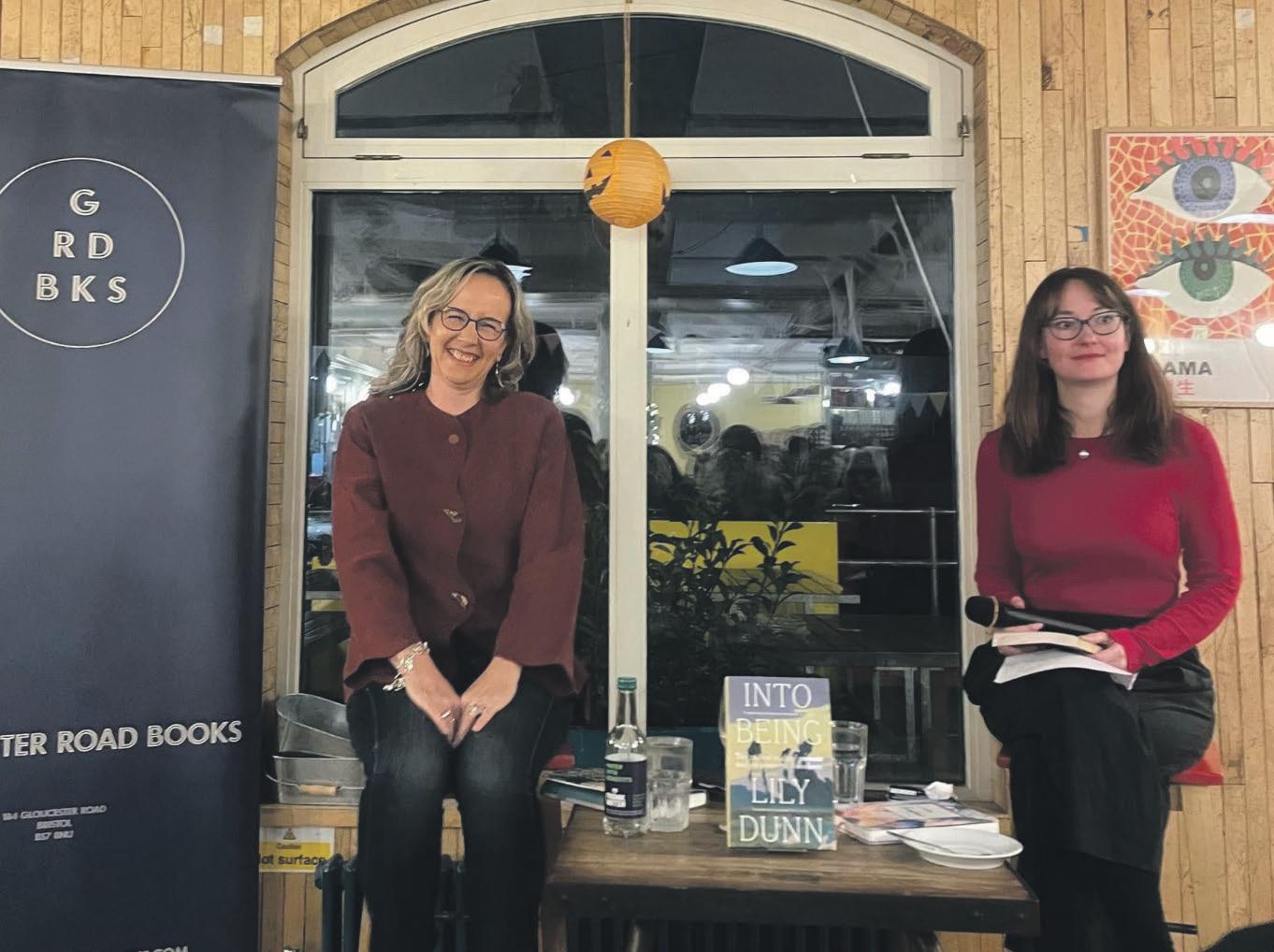
is inevitable that writing about hard topics, whether personal or not, can resurface di cult feelings and emotions, however, Dunn explained that the important thing is to realise the connection between the topic and emotions, and most importantly to ‘be kind to yourself.’ She also argues ‘it is important to remain open’ and see these feelings as part of the story too. She adds that catering your
“ It is important to remain
open to feelings that may come up' and see them as part of the story too.
writing environment to you is important as well to ensure it is a ‘safe space’ where these emotions are welcome and embraced. Of course, if writing about something traumatic, therapy is always recommended.
She was first drawn to memoir writing from her own journaling practise that started at the age of 8. She had a di cult relationship with her father who abandoned the family to be with a much younger woman and later join a cult, which is what Sins of my father is about. Due to her home situation, she felt anger towards her father who, in turn, suggested she start writing her feelings down and bought her first journal. She realised that writing made her feel better, starting by writing out her feelings on one page and soothing herself on the next. When her marriage broke down and father died of alcoholism, she found writing to be healing and began to write out of ‘necessity.’
Her favourite memoir is Educated by Tara Westover as she reached the end of the book
and felt ‘altered and slightly changed.’ She argues fiction can do the same but ‘there’s something about (memoir) being a true story that hits harder.’
Marianne Brooker’s questions prompted similar discussion as Dunn explains ‘writing Sins of my father was a way of reclaiming my life.’ Writing her story after her father had moulded her life through his choices allowed her to be liberated and begin writing her own story both literally but also in the chapters of her own life.
She added that she found her writing voice once she found her personal freedom and began following her heart. She acknowledges the cliche but emphasises that ‘your heart often knows the things that you don’t, but writing can bring you closer to that knowledge.’

Eleanor Bate & Lilja Nassar Deputy Film & TV Editor and Comment Subeditor
Hosted by Bristol Film Festival, the screening promised not just a cinematic experience, but an important conversation, joined by a couple of the brilliant minds behind the feature, one of the film's Director's, Jonnie Hughes, and Director of Photography, Gavin Thurston.
The event also carried a sense of immense pride for our city. Unbeknownst to many, Bristol plays a significant role in wildlife filmmaking. Local production company Silverback Films, dedicated exclusively to creating films that confront our environmental crises, are renowned for pairing powerful storytelling with breath-taking cinematography. Knowing that A Life on Our Planet (2020) was produced on our very door-
step gave the evening an added intimacy, a reminder that Bristol is helping shape the fight against climate change.
Silverback’s impact is undeniable: their recent release Ocean (2025) smashed box o ce records, opening to £573,551 at the UK and Irish box o ce, the highest-grossing debut for a nature documentary on record and the biggest documentary opening of the decade in the region. And based not only on their impressive list of accolades but also on my own experience watching this documentary, it’s safe to say they truly delivered.
After some light schmoozing, it was time to step into the theatre and take our seats for an intimate screening of



River Korkmaz & Lily Scogings First Year, Film and Television (2004), fol-

This year, one of the most anticipated encounters was a retrospective screening of the cult film Eternal Sunshine of the Spotless Mind lowed by a conversation with its writer Charlie Kaufman and director Michel Gondry. That the event took place in Bristol felt particularly significant: a city whose cultural venues — most notably the recently renamed Bristol Beacon, formerly Colston Hall — have long been sites of artistic innovation.










The space tightens as the audience finally settles, the last murmurs fading as the lights dim further, a brief stillness renders the room silent as the audience fixes its eyes forward.
The event underscored the enduring significance of Kaufman and Gondry’s collaboration whilst also showcasing
the evolution of their work as artists and what directions they have since followed. Kaufman’s recent short, How To Shoot A Ghost (2025), and Gondry’s latest feature, Maya Give Me A Title (2024) illustrate both their distinctive styles that have long defined their work, whilst charting new artistic territories.

On stage with Anna Higgs' moderation, the discussion offered insights into their creative processes; Kaufman, in one instance, revealed that he had once rewritten a small section of the film within a few hours of a single day while seated in a hotel, an anecdote that illuminates the meticulous care behind the film’s narrative complexity. He also reflected upon the myriad of endings he considered, exemplifying the interplay between intuitive precision and meticulous craftsmanship that he has artfully underpinned in his work.
The conversation also touched upon broader themes in Eternal Sunshine, especially within the preoccupation in which the film coarsely interrogates








Epigram has had exclusive access to numerous film festivals and previews across the month -- going ‘behind the lens’ to hear the invigorating storytelling by the team of David Attenborough's Our Planet (2020), an intimate discussion with the filmakers behind Mind (2004), and a dissection of the line-up for Bath Film Festival featuring a host of industry giants.






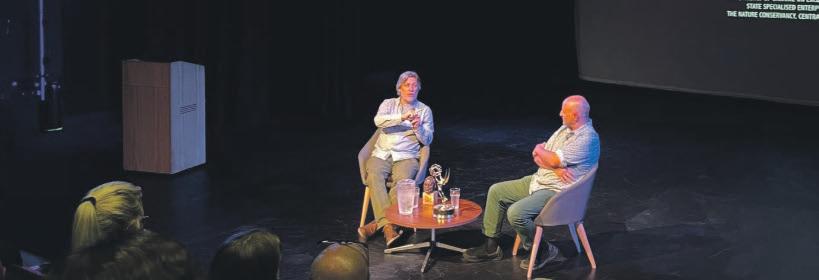
around 300 attendees. A short introduction from a Bristol Film Festival host gave way to a presentation by Hughes and Thurston, o ering the audience a glimpse into the filmmaking process behind this award-winning documentary.
They clicked through slides showcasing cutting-edge technology, candid on-set moments with Attenborough at his childhood home in Leicester, where his passion for geology and fossils first took root, and insights into a scripting process that remained fluid, constantly adapting to the ever-unfolding climate crisis. With a grin, they admitted to briefly outpacing Christopher Nolan’s Tenet at the box o ce on opening day, a short-lived victory, perhaps,
the complex ordeal of human nature and memory, forcing the viewer to locate their interpersonal memories of loss and recollection, rendering them tangibly real for a brief moment.
Encounters makes cinema a relational event: a negotiation between text and audience, auteur and interpreter, historical moment, and contemporary re-reading.
As the event finally drew to a close, the lingering of the persisting and enduring relevance of Michel Gondry and Charlie Kaufman’s artistry, but also the sense of Encounters itself as a space where such dialogues can thrive. Balancing retrospection with innovation, val embodies the very qualities it evokes, serving as a reminder of why, 30 years later, it continues to matter.
For the full article, go to: epigram.org.uk
but an impressive one all the same.
Their work took them across a range of striking locations, from Kenya to Tokyo, Colorado to Ukraine (one of the few countries Attenborough had never visited, and which Hughes noted they had the privilege of introducing him to).
Thurston, who went on to win an Emmy for his cinematography on the film, mentioned almost in passing a comment that has lingered with me ever since: his experience filming, and the things he bore witness to, led him to adopt a vegan diet — a commitment he has maintained in the five years since the documentary’s release. It is hard to fathom the scale of horrors one
must encounter to alter a way of life he had always known, overturning nearly fifty years of meat eating. That personal shift speaks volumes about the significance of this documentary, and why screenings like this remain so vital.
Life on Our Planet is, in equal measure, tragic and hopeful. While Attenborough and his team confront us with a sobering reality, accompanied by stunning cinematography, devastating natural beauty, and his authentic narration, they manage to strike a delicate balance between despair and determination. It is not all doom and gloom, but it is honest, urgent, and deeply poignant.
For the full article, go to: epigram.org.uk
The Bath Film Festival is back for its 35th edition! Between the 17th to the 26th of October, our neighbouring city will be host to over 50 di erent films, events and immersive experiences.
The Invisible Woman and Q&A with Ralph Fiennes
This extra-special screening of The Invisible Woman (2013), a period drama about the tumultuous a air between young actress Nelly Ternan (played by Felicity Jones) and Charles Dickens (played by Ralph Fiennes), will be followed by a live Q&A session with the director and award-winning The Grand Budapest Hotel, Schindler's List).
The IMDb Awards Ceremony is a celebration for two di erent filmmaking competitions that aim to uplift new talent in the film industry: the Script to Screen Award, a screenwriting competition, and the New Filmmaker Award, a short film competition.
Wild Swimmers behind The Colonnades


Wings (1927) and Live Organ Score by Dr Rebekah Okpoti


This whole event is hands-down iconic. First(1927), directed by William A. Wellman, which stars silent film actress and OG 'It Girl' Clara Bow, won Best Picture at the first ever Oscars, held in 1929.
Written and directed by Bath-based filmmaker Ric Rawlins, and filmed in locations around Bath and the River Avon, Wild Swimmers (2025) claims to be the world's first 'river vampire' horror film. Bugonia (2025, dir. Yorgos Lanthimos)
Fans of Yorgos Lanthimos and Emma Stone, you can catch their newest collaboration two weeks before it is fully released in the UK! Bugonia is a wacky dark comedy that manages to combine aliens and corporate America into one film.











Things are heating up for the 2026 film awards season with a diverse array of frontrunners. Epigram will be there at every twist and turn,
Earlier this year, Sean Bakers' Anora (2024) swept the Oscar's stage, a win for independent cinema and A24 especially. Anora was expectedly polarising, and whilst there have been many criticisms of Bakers' portrayal of sex workers in the film, it is undeniable that this best picture win was a leap in a more liberal direction and unusual, but not unforeseeable, for the Oscars.
A24 and Neon, both independent production companies, are now dominating the expected nominations, and whilst the prospective line up varies, it is certainly paving the way to a more politicised filmic landscape. One Battle After Another (2025) soared box o ce records, grossing $100 million in its first weekend, marking an impactful comeback from Paul Thomas Anderson and indicating that left-leaning cinema is certainly a frontrunner.
Sean Penn’s chilling and nauseating por-
Editor Felix Glanville
Deputy Editor ..............................Eleanor Bate
Deputy Editor Max Graham
Subeditor................................ Emma Coleman
Subeditor................................... Olivia Howard







trayal of Steven Lockjaw certainly went above and beyond to secure a Best Supporting Actor nomination. However, it’s hard to ignore how ceremonies showcasing some of the planets’ richest people and fuelling a lot of their egos, comes with a large scoop of irony when it comes to their capacity for political power.
It looks like it will be dicult for award shows to avoid films with politicised narratives in this upcoming awards season. Films such as Yorgos Lanthimos' Bugonia (2025), starring Emma Stone, who is expected to be up for Best actress, centres climate change, pointing to the responsibility of CEOs and large corporations and could see a Best Picture nomination based on its reception at Venice Film Festival.
an A-lister cast including Julia Roberts, Andrew Garfield and much-loved star of The Bear (2022) Ayo Edebiri. Critics have been far from complimentary of
“ It looks like it will be di cult for award shows to avoid films with politicised narratives
the films’ ability to tackle the #Metoo movement and woke culture, yet it was welcomed warmly at Venice Film Festival and received a six-minute standing ovation, so it’s impossible to rule out.
box o ce heights it perhaps deserved or at least strived to achieve, grossing a mere £4.3 million in comparison to its whopping £37 million budget. Safdie still won Best director at Venice film festival though, and perhaps it being a box o ce flop could be overlooked for Johnson’s staggering career U-turn of a performance, with biopics often winning in categories like Best Actor. Will the Safdie brothers be going headto-head for a win this awards season?
Of course, it would be di cult to ig-


In competition with Stone, we could see Jessie Buckley being nominated for Hamnet (2025), Jennifer Lawrence for Die My Love (2025) or maybe even Syndney Sweeney for Christy (2025).
‘Not another boxing movie!’ I hear you groan. Joachim Triers’ highly anticipated Sentimental Value (2025) also won the Grand prize at Cannes, but it’s not often that non-Hollywood movies win big.
Another politically charged film soon to be in theatres is Luca Guadagnino’s new film After the Hunt (2025), with

First up to the pass is Jon Favreau’s lighthearted comedy celebrating culinary authenticity and artistry as an expression of cultural heritage. At the start of the film, executive chef and protagonist Carl Casper works for a prestigious Los Angeles restaurant, representing the high-stakes, commercial pressures of the fine-dining industry. Frustrated with poor online reviews and a commercially-driven menu, he journeys o to reinvent himself through a new food business. ‘El Jefe’, a food truck o ering Cuban cuisine in connection to his own familial roots, allows him to be ‘the boss’, whisked away on a journey of food extends beyond the physical to both human and culture.
ly be nominated for costume design. Other honourable mentions that are looking strong for awards season include: A House of Dynamite (2025), Sinners (2025), which would carry on The Substance’s (2024) exciting horror legacy, It Was Just an Accident (2025), The Secret Agent (2025), Rental family (2025) and Park Chan-Wook's new film, No Other Choice (2025).


Benny Safdie’s The Smashing Machine (2025), stars Dwayne (The Rock) Johnson like you’ve never seen him before, he has hair! John Safdie’s Marty Supreme (2025), on the other hand, stars Timothee Chalamet like you have seen him before, in another biopic, in which he was previously nominated for Best Actor but didn’t win for A Complete Unknown (2024). Apparently, Chalamet has been learning table tennis for the past 7 years in preparation for the film.
Whilst many critics are commending Benny Safdie for writing, directing and editing The Smashing Machine, it hasn’t quite reached the opening weekend
nore Guillermo Del Toro’s upcoming reimagining of Franken- stein (2025), which could see Oscar Isaacs winning best actor and will be almost definite-

Stay tuned with Epigram for the latest and breaking stories from the Oscars, Golden Globes, Screen Actors Guild Awards and more as we'll be covering all the hype and build-up!



For our plat principal we have The Hundred-Foot Journey (2014). This is a film centred around cultural diplomacy, with French and Indian culinary heritage entering a relationship of mutual enrichment despite di erences in approach. The film begins with the Kadam family opening a vibrant restaurant opposite a prestigious Michelin-starred establishment in France, fuelling a cultural collision. Yet, the feud gradually softens into tolerance as both sides recognise cuisine’s power to transcend cultural boundaries. The universality of food makes it an influential watch and the viewer is exposed to how everybody has their own cultural connection to food.





Whether through small community café shops or DJ events mixing on vinyl, Bristol continues to find ways to make music feel tactile again.
Sofia Zarkov Fourth Year, English and Spanish
In the age of Spotify Wrapped and algorithmic playlists, the way we listen to music has never been more convenient – or more detached. We carry entire libraries in our pockets, yet the act of really listening and engaging feels increasingly rare.
Across communities everywhere, however, a quiet revival is taking place. Record shops, vinyl cafes, and venues are bringing music back into the physical world. In Bristol, this resurgence is especially tangible.
Buying a record or CD is no longer about convenience but an act of care, a choice to listen with attention and a reminder of the joy that comes with truly engaging with music.
staples:
Bristol’s established record stores
Rough Trade, Nelson Street
An essential stop for anyone in Bristol’s music scene, Rough Trade remains one of the city’s best known record shops. Its punk credentials stretch all the way back to 1976 and Geo Travis’ original Rough Trade Records that helped define the UK Indie sound.
The addition of a solid 150-200 capacity venue has welcomed signings and live gigs making it the perfect place to connect with the wider world of independent music.
Friendly Records, Bedminster
Friendly Records lives up to its name as the shop doubles as a café and small venue, having a focus on a relaxed and community feel. You will find new and second hand here, often alongside local releases.
Its record of the day feature is helpful for those looking to buy records for the first time.
Plastic Wax, Cheltenham Road
A true Bristol institution, Plastic wax is the place to find just about anything. Its packed from the floor to ceiling with second hand vinyl and CDs – funk, punk, soul, soundtracks. The sheer scale can feel a bit overwhelming, but that is what gives it its appeal and lets you find hidden treasures. You will almost always leave with something unexpected.
Hidden Gems and Newcomers
Alta Loma (Upper Maudlin Street)
A newer arrival on the scene, Alta Loma doubles as a taco restaurant whilst still focusing on a minimalist feel and serious attention to detail. It’s small but expertly curated selections lean towards underground, jazz, and experimental sounds and the combination of tacos and vinyl makes it a genuinely fun and unique experience.
Collector’s Cave, Cheltenham road
Collector’s cave feels more like a secret for those in the know. A selection of shelves and boxes, it’s home to everything from old school funk to rare house. Perfect for anyone making electronic music. It has a wealth
of obscure records and samples waiting to be discovered.
Perched above the Exchange venue, Specialist Subject is both a record label and a shop dedicated to punk, emo, and indie. It’s an essential stop for anyone wanting to dig into Bristol’s grassroots scene or pick up a release from a local band.
Hot Wax Bristol Records and Things, Sommerville Road
Hot wax is a record shop that had its opening in October, and promises to o er ‘an array of genres from Bristol-suitable electronic styles.’ The opening party hosted pizza and drinks and a lineup that included SWU.fm presenter Mike Shawe.
Vinyl’s comeback isn’t just about nostalgia. In Bristol’s electronic scene, it remains central to the music itself. DJs across genres, from house to jungle, still rely on the use and feel of vinyl. Mixing vinyl is a craft, a slower and more deliberate process that fits perfectly into Bristol’s music culture. Here are some places to listen.
Idle hands, City Centre
Idle hands have become a vital hub for DJs and collectors alike, o ering a carefully curated mix of house, techno, and UK bass. Serving as a record label, store, and venue, it has become the perfect place to discover new DJs.
This venue often hosts DJs spinning strictly vinyl, blending disco edits and deep techno.
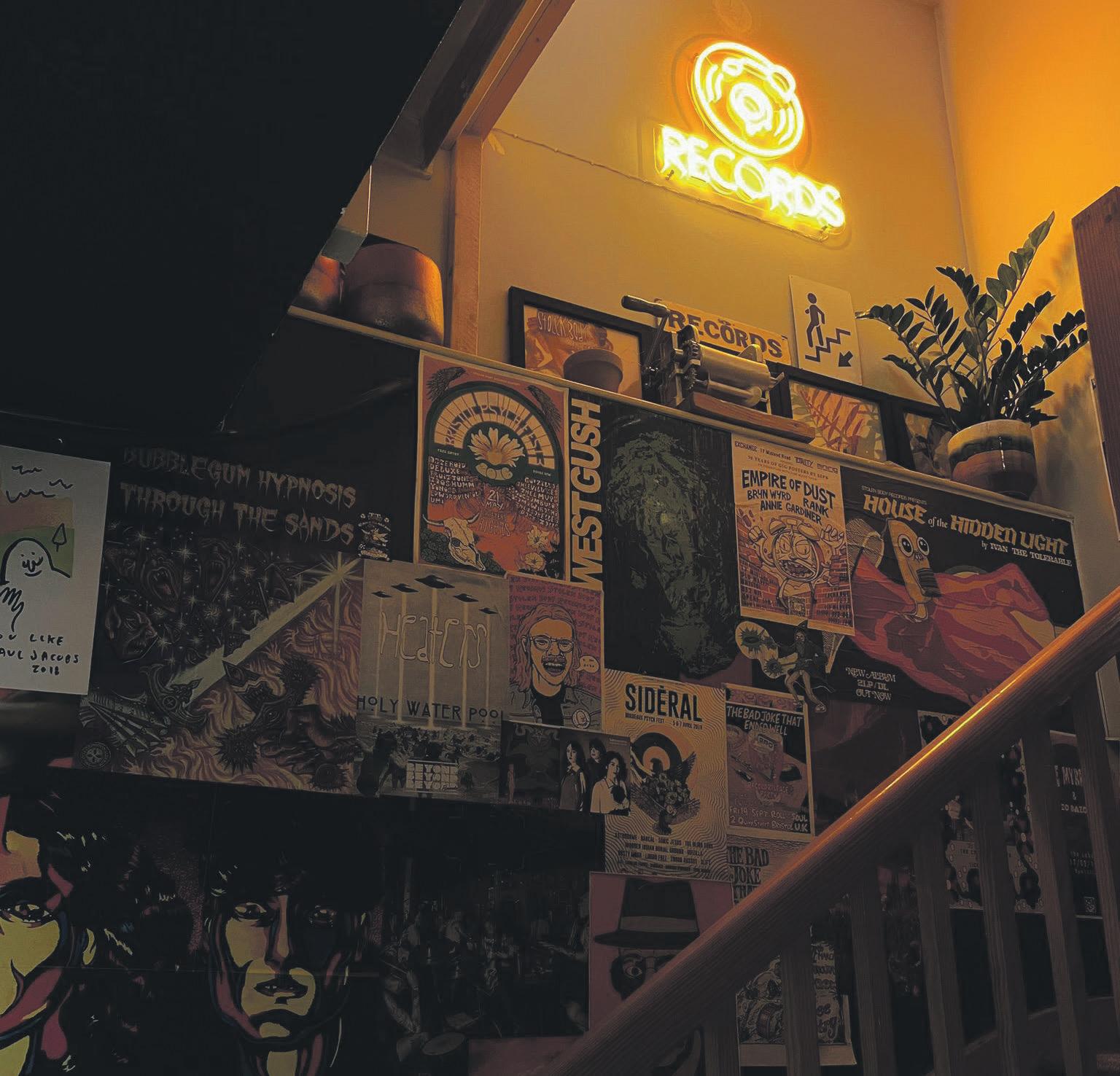
Cosies, Portland Square
Cosies regularly hosts oldschool themed nights with its roots, dub, and dancehall nights played straight from the decks.
Dareshack, Wine Street and Strange Brew, Fairfax Street
Both venues also regularly feature vinyl-only sets, especially from the city’s more experimental collectives.
In a city built on basslines, it seems that vinyl never really went away. It remains both a tool and statement, proof that even in the digital age, Bristol still listens through it. In an age when music is everywhere, that’s exactly what makes it worth seeking out.
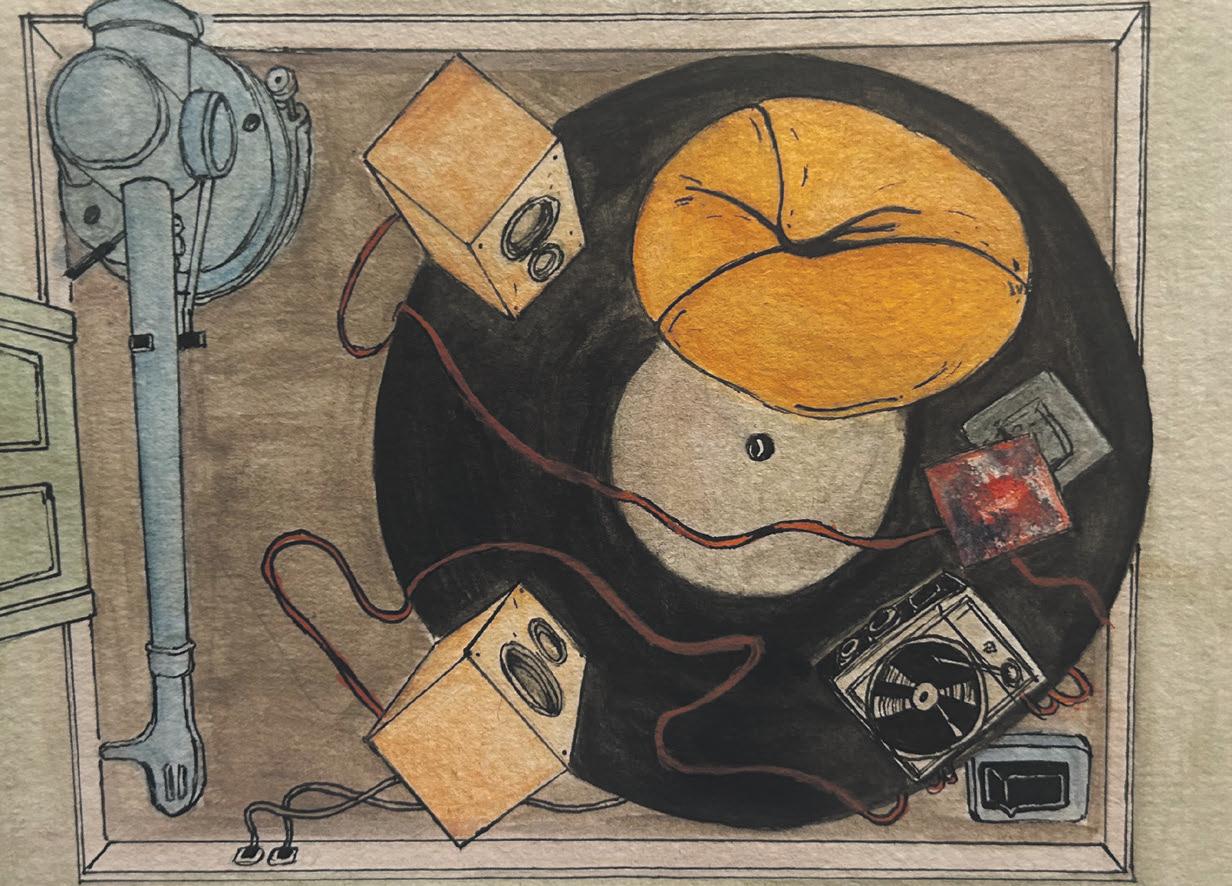
Produced by the teams behind Crack magazine, Love Saves the Day, and FORWARDS, the lineup for the multi-venue Simple Things festival is set to deliver some of the most exciting names in contemporary music culture.
Names hot o the press to complete the lineup include shiny hyperpop visionary BABii, synth wizard Danalogue, and Tracey, whose provocative A. G. Cook-esque breakout single ‘Sex Life’ featuring Riko Dan is sure to turn heads.
space
Hidden in the Cellars space of The Bristol Beacon will be a full day of electronic experimentation, co-headlined by Bristolian dubstepper Joker, and frenetic artist-producer aya.
Things
The weekday programme starts on Tuesday the 4th of November, with one gig each night until Friday, featuring Moin, John Maus, Autechre, and Daniel Avery respectively. Saturday the 8th of November is when it all kicks o – Simple Things will showcase an impressive number of boundary-pushing artists across multiple city centre venues including all Bristol Beacon spaces, Strange Brew and Rough Trade, just to name a few. Highlights include impossibly aloof post-punk four-piece Dry Cleaning, whose performance is sure to be a tantalising one following the recent announcement of their third album.
Simple Things Festival runs from the 4th to the 8th of November.
Poster courtesy of: Plaster

Dabrowka Nowak
Third Year, English
Editor Sophie Scannell
Deputy Editor Aditi Hrisheekesh
Deputy Editor ..................................Eve Davies
Subeditor Anastasia Baker
Subeditor Arianna Balsamo

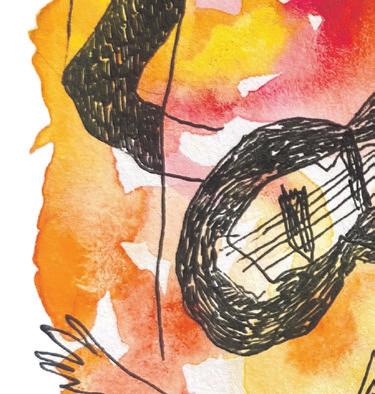







Willyou be grieving next summer’s Glastonbury festival as it undergoes its dreaded fallow year? Well, ‘Dry Your Eyes’ as Bristol Sounds is ready to help you out of that slump. The 2026 festival has been confirmed to take place on what was meant to be Glasto’s weekend, and you ‘Could Well Be In’ for one of its most impressive lineups to date.
Returning to the harbourside on the 26th and 27th of June 2026, the beloved open-air festival will continue to host a menagerie of fantastic acts. The festival has announced its first two headliners of the weekend: synth-pop enthusiasts, Orchestral Manoeuvres In The Dark, and UK garage hall-of-famers, The Streets.
With plenty more acts to be announced, Bristol Sounds has already cemented its place in next summer’s festival season to be one of the most exciting - the perfect fit for that Glastonbury-shaped hole in your heart.
Being within the Bristol music scene, chances are you’ve heard of Tricky, the genre defining trip hop artist who soundtracked the 90s and kickstarted Massive Attack. And now, the icon is set to return to Bristol for a rare performance.
On the 17th of May 2026, along with special guest and collaborator Polish artist Marta Złakowska (‘Marta’), Tricky is set to play Bristol Beacon as a part of a three location UK tour. Bristol Beacon promises a ‘striking visual design’ and ‘powerful live experience.’
As the 2023 renovated venue aims to explore the richness and complexity of Bristol music scene’s artists, Bristol’s most iconic will bring with him a stunning display of his own life played out in music. The show at Bristol Beacon is destined to be spectacular. Tricky has defined the so-called Bristol Sound, crafted trip hop and brought to light the talents of many other artists. He is genre blending, defying, defining, with only ever having the aim of ‘[saying] that some good stu can come out of Knowle West’ (The Wire). And he inspirationally proves time and time again that it indeed can.
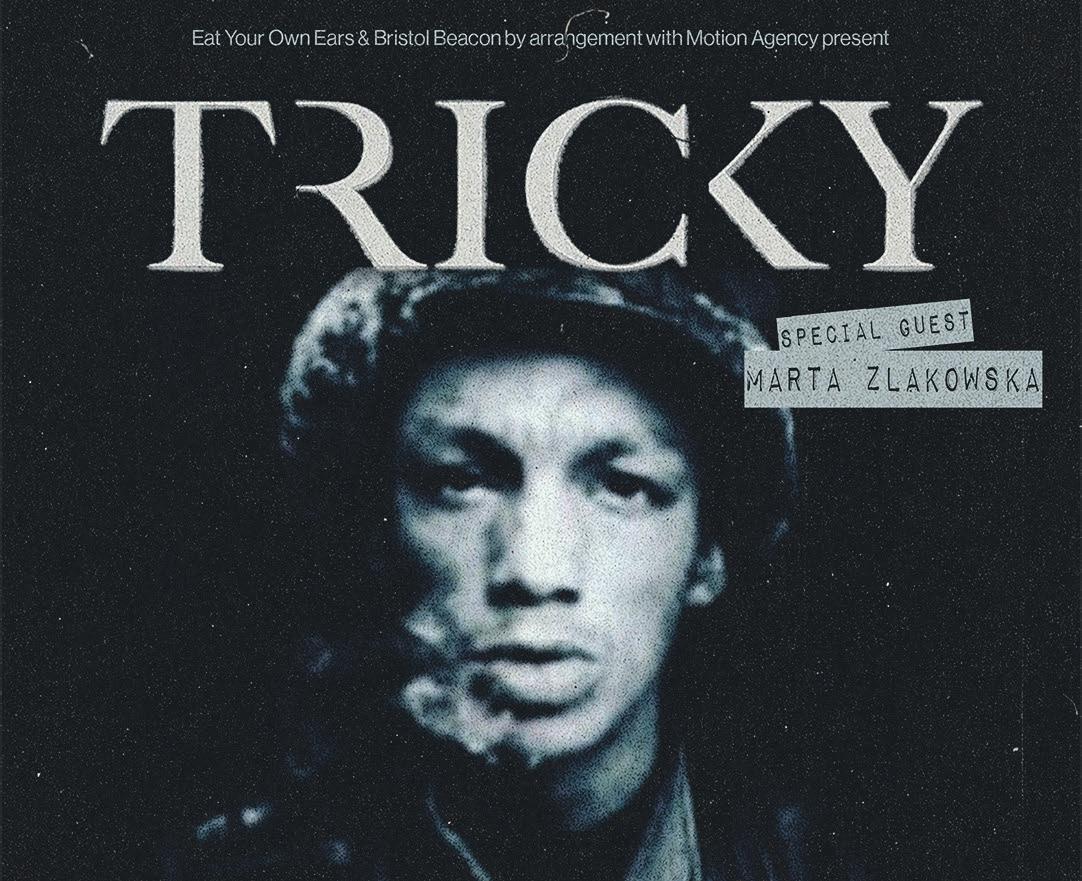










We're all familiar with the scene. Students ambling around campus, heads adorned with devices designed to shut out the world. Are we really better o like this?
Lindsay Shimizu Deputy Comment Editor
Last semester I took advantage of my noise-cancelling headphones to fill in the gaps in my day unoccupied with lectures, seminars, or studying. My walks to school were filled with news debriefs and I brushed my teeth to podcasts about T.S. Eliot. When I wasn't fixated on cramming in more information, I soon found comfort only in blocking out every other noise. I soundtracked every errand and task in and outside my flat. By the end of term, I wore my headphones for more than five hours daily, and I couldn’t get through a day without them.
This summer, my precious over-the-ear headphones broke, and I was reduced to listening on a cheap pair of wire








these walks were suddenly harder, even more overstimulating.



I went from ‘It’s hard to focus with external noise’ to ‘I cannot function if I do not block out everything’. Conversations have started on whether headphone usage is correlating to a rise in APD, an audial disorder that worsens one’s ability to understand sounds including spoken words. I wasn’t struggling to hear, but I was certainly counteracting the proven benefits of walking or silence. The same headphones proven to reduce anxiety were making mine worse because they kept me from mindfulness.
Constantly distracted, I couldn’t even sit in silence with my own thoughts. Headphones seem to be a quick solution to overstimulation, but they can easily become a crutch. By no means can they work alone in reducing sensory overload.
My summer continued, and I bargained with which anxieties to confront. When my headphones broke, I immediately wanted a new pair. Facing outside




swirling, I put o purchasing a new pair until the start of fall semester.
I experimented with limiting background noise out of necessity, but I spent the summer realising that sitting in silence and facing jarring noises was, in fact, possible. I did end up buying new headphones this year, and I still struggle with anxiety. The di erence now is how I choose what to do next. Walking to campus, for instance, is now a deliberate and conscious e ort to leave my headphones at home. It gives me agency and control, feelings often lost when I feel my most anxious. Though the walk is still boring, walking and silence and boredom make me feel more reflective, creative, and calm. It’s a chance to think and sometimes talk aloud (no business worrying if people are listening–they all have headphones on).

When it comes to headphones, there are times in your day where I am sure you put them on, not because you’re excited to listen to a new song but simply because you just don’t want to hear what’s going on around you. Beyond reducing headphone use, I encourage you not to stop, but just experiment. Try walking without headphones or take them o to do the dishes. Ask yourself: ‘What happens when I sit in discomfort. If I stop listening, what might I hear?’






Many of us may have mixed feelings when thinking of the upcoming winter. With increases in illness, feelings of fatigue, and the dreaded winter blues, the colder seasons can be a tough time for lots of people. But what actually is it that causes these issues?
Anna Dunphy
Second Year, English
Both biological and social factors play a role in seasonal fluctuations in mood. On the biological side of things, research suggests that shortened periods of daylight in the colder months can impact our hormones, which in turn a ects our mood.
Reduced sunlight exposure can lead to lower serotonin levels, a hormone that plays a key role in regulating mood. This can lead to increased risk of mental health issues. Sunlight also a ects melatonin, the hormone responsible





for regulating sleep-wake cycles. Some research has found that longer nights in winter can lead to increased production of melatonin, which can cause sluggishness. Lack of sunlight exposure also leads to reduced production of Vitamin D, which has been linked to depression and anxiety.
Social and cultural factors can also play a role in feelings of sadness. For example, cold weather can make people less willing to go out and see friends and family, therefore causing feelings of isolation. For university students, exam season and deadlines towards the end of the winter term can also increase stress.

There are also changes in mood and behaviour in the summer months. Studies have noted an increase in violence in the summer months. For example, research on the rates of violent crime in Philadelphia reported a nine per cent increase in violence on hotter days. It has been theorised that this is due to physical discomfort caused by the heat, increasing the likelihood of violence.
Dips in mood also can occur during the warmer seasons – around 10 per cent of Seasonal A ective Disorder cases occur during the summer. Potential factors for this include physical discomfort in heat or humidity, the social expectation to have fun during summer, body image issues, and disruption to routine.
The seasons also tend to play a role in the spread of illness. We almost always see an increase in respiratory infections such as influenza and Covid-19 during the winter. One reason for this is reduced humidity in the air during the colder months; this means that, for some viruses, droplets released from coughs, sneezes, and talking hang in the air for longer periods of time and are able to spread further. People’s behaviour also a ects this spread of disease; during colder months, we are more likely to spend time close together indoors, increasing the spread of infection.
Seasonal changes can be a di cult time for many. Therefore, as we move into the winter months, it is important to try to get outside during sunlight hours, keep in healthy routine, and seek professional help if experiencing severe symptoms.





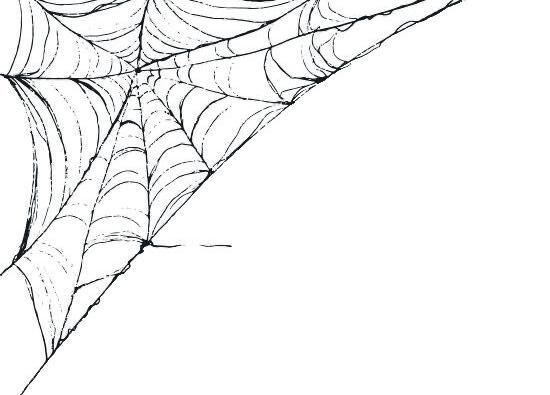
Whether they are under your bed, hanging from the ceiling, or lounging in your flatmate’s abandoned socks, our eightlegged friends are back just in time to join us in celebrating spooky season. And while they reside rent free in our extortionately priced student accommodation, it is hard not to wonder: why do so many appear around this time of year – and what we can do about it (for my fellow arachnophobes out there)?
The reason we see so many spiders during autumn is because their mating season typically falls between August

and October, meaning they appear in mass in student housing right in time to join us for freshers week and beyond. It is within this period that male spiders abandon their webs in treacherous pursuit of females waiting to be wooed, embarking on a quest through our windows, across our ceilings and behind our furniture. And such a journey can end only in two ways - love or lunch.
So now we know the reason… but what happens next? With female spiders being up to ten times the size of their male counterparts, the males must approach with caution when courting a female. Their display of courtship can include dance-like motions and ‘tremulations‘ (rapid shaking in order to produce vibrations) to demonstrate their health, strength and compatibility - since di erent species
of spiders have di ering approaches. With this, ultimate power falls to the female, deciding on the e ectiveness in which the male coordinates both the visual and vibratory aspects of the courtship. If she is not impressed, she can quickly become aggressive and our Don Juan could become dinner.
And, with this tinder-like frenzy sending spiders into our homes, what do we do? Well, for those who are braver than I, the overwhelming vast majority of spiders, particularly in the UK, are harmless, so they usually can safely be ignored. Although it may seem like it, their presence is not intended to cause fright, but rather they are working as one of nature’s best insecticides in your homedealing with mosquitoes, roaches, moths, flies and other creatures that can spread disease. It is important to remember that

Corin Hadley




Deputy Editor Alice Guskov





Deputy Editor Sanya Saxena




Deputy Editor Jemima Choi

they are simply trying to survive, driven by a need of food, water, and shelter and they are actually an indicator of good air quality within your home, as spiders do not typically decide to live in polluted environments. However, if you do wish to keep Halloweenlike festivities outside this year, there are ways to reduce the likelihood of finding a spider in your home.
The first is to reduce clutter and keep the area clean. Last week’s dirty dishes only attract insects, which in turn attract spiders, and messier areas give spiders more spaces in which to conceal themselves. In addition, spiders are attracted to light, so limiting outdoor lights during the night can be beneficial if you wish to keep them away. Finally,
Grace Golby Third Year, German, Russian, and Spanish
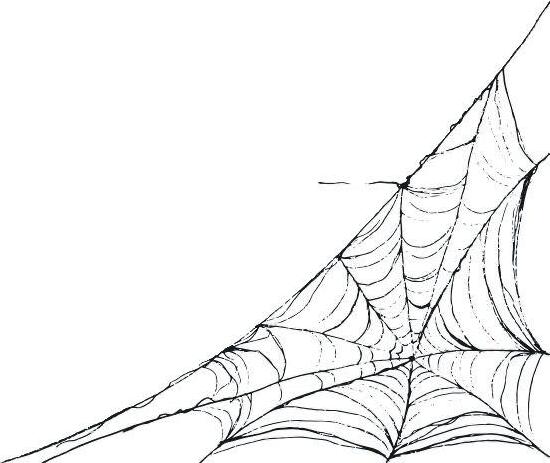
strong-smelling essential oils can act as a repellent for spiders, including ones with scents such as lavender, eucalyptus, citrus, tea tree and peppermint.
So, spiders have returned to celebrate all things spooky. Are you ready?
You jolt awake, unable to move. A figure looms in the corner of your room. But now is not the time to be picking up the phone to the Ghostbusters. The horror you face is far too real for them.



October of first year. Tucked in for an early night, after a relentless cycle of evenings haunting the Berkeley and stumbling home from The Triangle, followed by blearyeyed Badock breakfasts and rushing for the U1 on minimal sleep. A series of weeks thoroughly enjoyed, but at the detriment of a healthy sleep schedule. Occasional naps after lectures had just about got me through, but only barely. It didn’t take long before blissful sleep washed over me.
It felt like only moments later, an unsettling weight on my chest brought me begrudgingly back to consciousness. A tall shady figure, watching me, from across the room. Panic immediately set in. Reflexively, I tried to jump up against the wall: my body unresponsive. My eyes flicked across the room, exercising the only control I had, to try and make sense of what could possibly be going on.
The realisation that this was some horrific form of a nightmare set in quickly, and the next agonisingly slow minutes were spent trying to ‘wake up’ and willing the figure in the corner to disappear. The phantom presence petrified me, despite my clarity that this wasn’t real.
The contradiction between my understanding of the situation and the unshakable panic it had instilled followed
me through the next couple of days.
This freakish phenomena of visits from strange paranormal visions and figures featured twice over the following two years at Bristol, and always coincided with my highest stress and lowest sleep health. These spooky sightings were what’s known as sleep paralysis: hallucinations in a state of clear environmental perception, often when you first fall asleep or start to wake up. Around 28 per cent of students are likely to also have experienced sleep paralysis at some point. It begs the question –how many other first year bedrooms are haunted by real life ghosts?
The factors increasing risk of sleep paralysis are characteristic of the stereotypical student lifestyle. Although often symptomatic of narcolepsy, isolated sleep paralysis (ISP) is independently occurring rapid eye movement (REM) parasomnia, featuring incubus hallucinations (heavy weights on the chest), intruder hallucinations (ghost figures), and illusory movement. The likelihood of ISP is increased by lifestyle factors such as decreases in sleep quality, long naps, and, of course, excess stress and alcohol consumption. It's no surprise then that, as my 19-yearold self completed the halloweekend bender, with the stress of a relatively new city, friends, and course, that the horrors of ISP managed to sneak in.
ISP episodes occur in the transition
between sleep and wakefulness. During sleep, the pons and ventromedial medulla (areas of the brain stem) suppress movement of skeletal muscle with GABA and glycine (the major inhibitory neurotransmitters). This stops you from acting your dreams out and destroying your aesthetically curated bedside table setup. Sleep paralysis occurs when you wake up before that muscle inhibition is over, resulting in the sensation of feeling hyper-awake, while paralysis remains.
Destabilisation of your REM-wake boundaries due to disruptions like stress, alcohol, and sleep irregularity can result in the manifestation of REM dream-like images intruding into your wake state. The visual and limbic systems in the brain are still essentially dreaming while you’ve woken up under the inhibitory influence of GABA and glycine. The overactivity of the amygdala – an area of the brain responsible for emotional reactivity – explains the intense fear, and the lags in comprehending your environment due to your prefrontal regions still coming around. Disruption in the temporoparietal junction during REM-wake interference is associated with perception of eerie presences and mismatched sensory input. As a result, your brain can attribute its own bodily sensations to another being. The likely cause of hallucinations is the dysfunction and interaction of systems which normally provide
you with restorative sleep and not terrifying paranormal encounters.
Sleep paralysis could be the explanation for a multitude of historical accounts of demons, spirits, and incubus syndrome. Across multiple cultures, accounts of sleep paralysis have been interpreted as paranormal encounters: in traditional Nigerian culture, attacks from female demons at night cause paralysis; in Japanese, ISP can be attributed to vengeful spirits causing su ocation (maybe an explanation for incubus hallucinations); inuit shamans believe ISP to be the work of spells, paralyzing the poor recipients and causing shapeless presences. Accounts of incubus syndrome, the underpinning theme of recent cult-favourite Nosferatu, is thought to originate in experiences of ISP in women, who report experiencing dark sexual encounters with demons as a component of sleep.
Fortunately for my fresher self, scientific rationalisation alleviated some of my concern. I found accepting that stress had led to a little blip in my brain’s sleep-wake systems a lot more manageable than ideations of curses, demons, and ghosts. Although the brain can play horrible, cruel tricks on us, it generally does a good job at dealing with the complexity of existing day to day. Maintaining lower stress, healthier sleep, and lightening up on the ciders is definitely a simpler fix than sourcing a priest happy to exorcise Badock hall.
Women's futsal is on the attack - why has it taken the game so long to find its footing?
Lucy H Watson Third Year, Geography
Whenever I tell the story of how I met my girlfriend, I lie just a little bit. It was a Friday evening, the sun was setting over the Indoor Sports Centre and there we were, catching each other’s eyes as we played football. Very romantic. Not entirely true. It was in fact futsal that we were both trying for the first time that lovely Friday of last year.
Hailing from Uruguay, futsal, or futbol sala, was designed as a salvation for aspiring ballers who lacked enough players and/or pitch space for a traditional game of football. Five-a-side and on a smaller indoor pitch all you need is a village hall and someone to explain that you’re actually not allowed to do throw-ins (oh and a different goal, ball and shoes). Simple.
Nearly a century after its conception, the sport has boomed in popularity
with an estimated 30 million players worldwide. Fast-paced and spatially-condensed, the game is credited with shaping the controlled play of its devotees from Ronaldo to Pelé and is now the dominant childhood sport in Spain, Brazil, and France. So, with just 17,000 players, why has the UK been left behind? Why is futsal still an unknown that I can’t quite be bothered to explain every time I talk about meeting the one? And, in a country where the Lionesses are a household name, where on earth is the women’s game?
The gender gap in sport is not exactly a new concept, but even I, a female athlete who might as well have ‘feminist’ tattooed across my forehead, was surprised to find out that while the first ever men’s futsal world cup was held in 1989, the first ever women’s one is... next month. While sadly, the England squad did not qualify for the tournament, it’s a marked improvement from their performance at the last Euros in 2023 where the team did not exist. Not only are our national players relatively unknown by the public, they are relatively unloved by the FA, receiving a grand total of zero pounds in funding. The men’s team has had the luxury of existence for 17 more years than the women but, in a fabulous step towards gender equality, the



FA don’t give them any money either.
The governing body’s apparent reluctance to form and fund national squads is undoubtedly a big driver in the UK’s lack of futsal mania. The dividends of investing in the top are so easily seen when you turn to football’s Lionesses; as they lifted back-to-back Euros trophies, participation in girl’s and women’s football more than doubled nationwide. I myself am part of that statistic, taking to the beautiful game only after being exposed to the fantastic female role models within it. But the FA does not appear to be eagerly pushing this success across to the team’s futsal counterpart. Formed only last year, a future without funding could see them facing the same stagnant fate as the male players, never qualifying for major tournaments and never catching that magic ticket to boost the sport’s name at home.
Despite this rather large obstacle, all hope is not yet lost. While English futsal players may not be making headlines on the world stage, there are plenty of players in Bristol who have got the ball rolling and are ready to share their love for the game.
Miren, a third year mathematics student, has been playing futsal for more than ten years and is part
Rachael Fay
Second Year, Film and English
World champions, cowgirls, and women supporting women. For the second time this summer, England's women have brought home another piece of silverware. This time, the Red Roses (England's women's rugby union national team) have lifted the World Cup trophy to the second biggest crowd in a Rugby World Cup final ever. Women's sport is on a high - let's keep it there.
Exactly two months to the day after the Lionesses brought home their second Euros title in July, the Red Roses have smashed their campaign to do the same in the 2025 RWC for the first time since 2014. Rugby fever has spread across the country, from Newcastle and Northampton, right to our very own back door, as the quarter-finals and semi-finals for this tournament were hosted at Ashton Gate Stadium, home to the Bristol Bears.
The Roses have won the Guinness Women’s Six Nations 13 times and become World Champions for the third time. Their historic successes prove, yet again, that women belong in professional sport - to sold-out stadiums. The Red Roses vs Canada final at Twickenham, was the second biggest attendance of a RWC final ever for both men and women. Not only that, when I went to the semi-final game against France, Ashton Gate was filled with both men and women – England is England and rugby is for everyone. I am so proud to be a woman, so proud to be part of this in my own small way, and so proud to be English. This feeling is rare - and I'm soaking it all in.
The Women’s Rugby World Cup only started in 1991, and only England, New Zealand and the USA have ever won it. In this new space incredible new audiences and investment, we need to remember where women's sport started: with those players who we don't see on our TVs. This isn't just about England, this is about rugby growing globally and for everyone to have access to it.




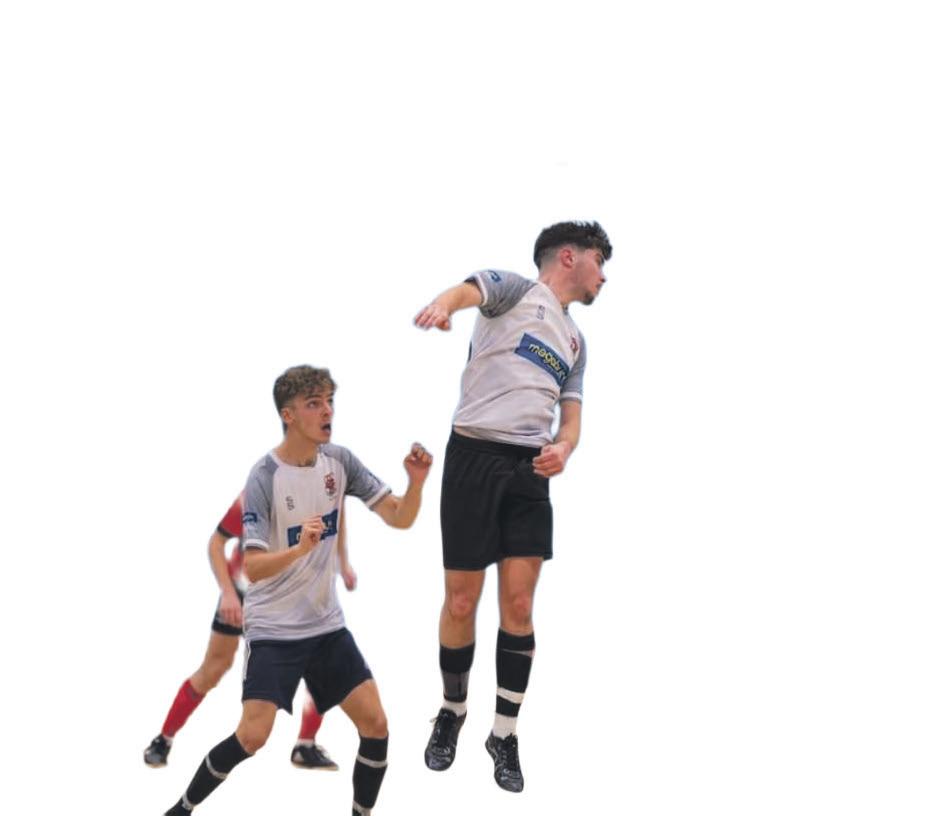
of the current movement to establish the University of Bristol’s first ever women’s futsal BUCS team.
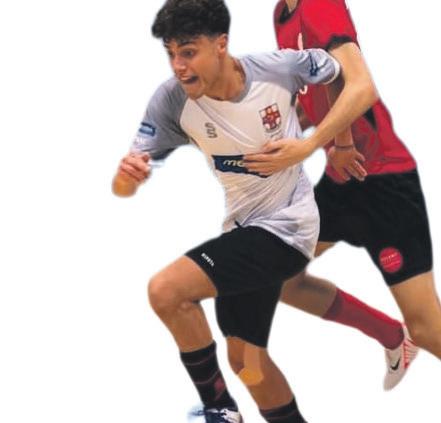

Speaking to Epigram, she said:
‘There’s no doubt that futsal [isn’t] really promoted as a women’s sport, and isn’t well known to many, but I’m really keen for it to be pushed so that we can compete.’
But what keeps her coming back to the sport?
‘To be honest with you, I prefer futsal over football, futsal has this great fun fast-paced feel to it that makes it so enjoyable, and it tests your technical skills in a way that I personally find so much more exciting than normal 11-a-side football.’
Christina, a third year law student and proud member of UBWFC (University of Bristol Women’s Football Club), sees the game as an entertaining way to improve her football skills.
Speaking to Epigram, she said:
‘The two sports have a symbiotic relationship.’ ‘Futsal improves my football, and football improves my futsal.’
Like Miren, Christina is keen to see the sport grow at the uni, hoping it can one day reach the great social heights of the six-team UBWFC massive (see Benidorm
Tour 2025), or at least start building the recognition it’s well earned by now.
With the odds stacked against it, women’s futsal in Bristol has persevered and created something rather special. Something that, upon reflection, I feel guilty about overwriting all of those times. Speaking as a player myself, I cannot recommend getting involved enough. Who knows? You might even find true love...
Women’s futsal is on every Friday from 17:00 to 18:00 in the Indoor Sports Center. You can book a place on the B-Active app, no experience or boots required.
If you do fall in love (with a player or the game) our coach Jono would love to let you know that you can get a yearlong membership for just a tenner (!).
You can also play outside of the uni every Monday night (18:20) at a casual training session at Bristol City Academy, and every Friday night (19:00) with National Futsal League team Futsal 360 at Ashton Park School.
P.S. there’s lots of interest from other universities to play some friendlies against us soon, don’t miss out on the fun!
Since going fully-professional in 2019, the Red Roses entered this 2025 home tournament with the momentum of the Lionesses back-to-back Euros victory in July, and now they are World Champions under World Coach of the Year (2025) John Mitchell. Globally, women make up a quarter of rugby players for the first time. In the words of Hannah Botterman in her Instagram post following the Red Roses’ semi-final victory, ‘Bristol you were outstanding, everything this game needed is happening now.’
Sadly, most of the noise surrounding this tournament is that the teams are women’s and not men’s; it is starting important conversations about equal ity. As Ellie Kildunne, 15s Player of the Year and Six Nations Player of the Championship in 2024, explained in an interview with Women’s Health about the importance of women being strong outside of sport: 'your body is your tool [...] it takes a lot of hard work to get muscle [...] body type is di erent in every single person - that's one of the things I love most about rugby'.
On the Red Roses’ Instagram, they posted a photo of a piece of paper where two fans had drawn a rose, and written, 'thank you for showing the world that di erent bodies can be strong and beautiful'. These words are so powerful – this RWC is changing so much beyond the game.
These women have fought and sacrificed for funding, training and for their dreams and finally, all eyes are on them. Like the Lionesses, many of the Red Roses have had to hold full-time jobs in addition to training to fund their rugby careers. Alex Matthews said in her interview with England Rugby that
On the Red Roses’ Instagram, they posted a photo of a piece of paper where two fans had drawn a rose, and written, 'thank you for showing the world that di erent bodies can be strong and beautiful'. These words are so powerful – this RWC is changing so much beyond the game.
These women have fought and sacri-
ficed for funding, training and for their dreams and finally, all eyes are on them. Like the Lionesses, many of the Red Roses have had to hold full-time jobs in addition to training to fund their she didn’t expect women’s rugby to be professional in her lifetime, but their futures have been secure since 2019 as a fully professional squad. Even Canada, England's opponents in this RWC final, are not a completely professional team and crowd-funded almost $700,000 to get here. This serves as a stark reminder of how steep the inequality within rugby still is. Every colour of shirt has given everything to be the rolemodel that they wish they'd seen growing up. Their stories, such as that of Abi Burton, Emma Wassel, Abby Dow, Rose Galligan are a testament to how much it means to play for their countries. To read more about


Editor .............................................. Emma Gri ths
Deputy Editor Ava Featon
Deputy Editor Benjy Howard
Subeditor....................................... Weronika Lecka
Subeditor Edward Wallace


Rowing epitomises the opposite of what university usually entails: early mornings, strict routines and utter commitment. But why do these athletes devote their prime years to the sport?
Arabella Hodges
Third Year, English and Philosophy
Becoming addicted to failure was not something I had on my university bingo card when I was putting in those UCAS applications oh-somany years ago. But when, in classic Bristol-student style, I encountered my first failure at the hands of the Oxford admissions team, I started to seek out failure as something of a habit. This is when my head was turned by the University of Bristol Boat Club.
As someone who'd previously rowed as a junior, I thought; a Bristol rowing squad filled with novices who have never rowed before - I must fare well, right? Ha. The
only way I can describe university rowers without profanity is to say that they strive towards a complete degradation of the self. I cannot overstate this point. Only once an individual has accepted that they are a witheringly wretched, worthless excuse for an athlete can they begin to progress within the sport.
This aforementioned physical breakdown is so entire that it pushes athletes to collapse. When the Bristol rowing squad selects who they want to train up to have on their competitive team, the selection doesn't ride on the basis of innate natural ability, nor current fitness levels, nor physical composition (although hitting heads on doorframes does usually get feet through doors in this sport), but instead how far one can push themselves, or put themselves 'in the bin'. At some point in their sporting career, every rower will hear the phrase 'you throw up before you pass out, you pass out before you die', and nothing could more accurately depict the erg room culture.
If you come o the rowing machine an d can stand, walk or talk, the burning stares of your teammates carry an implicit question: were you even trying?
The pain endured on a rowing machine is not an easy one to put into wordssome say it's worse than childbirth, except rather than birthing a screaming pile of vomiting meat, you become one. Because, ultimately, the only thing that is better than having the best rower as your teammate, is having the teammate that is the most willing to kill themselves, the one who they know would lose a limb before they had anything left to give on the finish line of a race.
Rest assured, failure in rowing is not limited to the physical. You would think that so much high intensity training means winning some races, right? Wrong. For reference, Bristol University is good at rowing. The men's squad has been consistently high-achieving for many years, with athletes going on to compete for GB, and the women's squad is now beginning to match the top level performances of the men. Yet, we race to lose, or to lose by slightly less , or to be able to compete in a higher category ... and lose by more. Never has there been a sport with so much input for so little output.
So, why row? This is a love letter to pain after all. Despite the claims of my flatmates, the draw of rowing is not
For the next installment of Epigram's new column, which investigates a new sport within the university every week, Ed Wallace has launched into the world of volleyball - and has even joined UOB Volleyball on the courts!
Volleyball is spiking in popularity, and not just on the beaches of California or on Olympic courts. Across UK universities, the sport's mix of athleticism, teamwork, and high-energy fun is winning converts fast. At the University of Bristol, that momentum has landed squarely in the hands of its thriving Volleyball Society, a club that is part competition, part camaraderie, and has an all-round good atmosphere.
'We're a thriving, active community', says Sophia Lee-Baum, captain of the Women's 1st Team. 'It's for everyone'.
That openness defines the society. From total beginners to BUCS -level athletes, players find their places quickly. The club fields multiple men's and women's teams across divisions, including top squads competing in BUCS Premier South and development groups for those just learning to play.
'There really is a level for everyone,' Sophia explained. Weekly development sessions run at di erent times, making it easy to fit volleyball around studies and the social calendar. Wednesday home matches draw lively crowds, with members packing the sidelines to cheer their teammates on.
Interest in the sport at Bristol has soared in recent years, helped by its welcoming culture and international reach. 'We've got players from all over the world' Sophia noted, describing a society that celebrates diversity both on and o the court. Growing demand even led
to a brand-new fourth men's team this season, proof that volleyball fever is spreading fast.
I decided to see what all the excitement was about and went along to one of the Development sessions myself. Everyone was incredibly friendly, especially the student-coaches, who were eager to share tips and help fine-tune technique. The energy was infectious, and even as a new-comer, it felt easy to get involved and improve with every rally.
simply to hold over the heads of those around me that I am better than them because I woke up five hours before them. I don't row because I think I'll win, or even because I enjoy the sport in the traditional sense of the word, but because it is the most wonderfully pointless passion one can have. It is a hobby that gives nothing back, yet demands everything, and what could be a more perfect life lesson than that?
Rowing epitomises man's search for meaning. I am not a good rower, I will probably never be a good rower, but I have learned how to give my whole be-
ing to an impossible achievement. In rowing, everyone becomes Andrew Neyman from Whiplash, desperately searching for the "good job" from their coach that will probably never come. But as Neyman himself showed, passion was never about pleasure, pride, or praise - but the silent, stubborn act of testing your limits, of finding out who you really are when no-one's asking anything of you.
If you read this article and found this sport even half appealing, you should get in touch with @uobboatclub on Instagram, or check out the website uobboatclub.co.uk

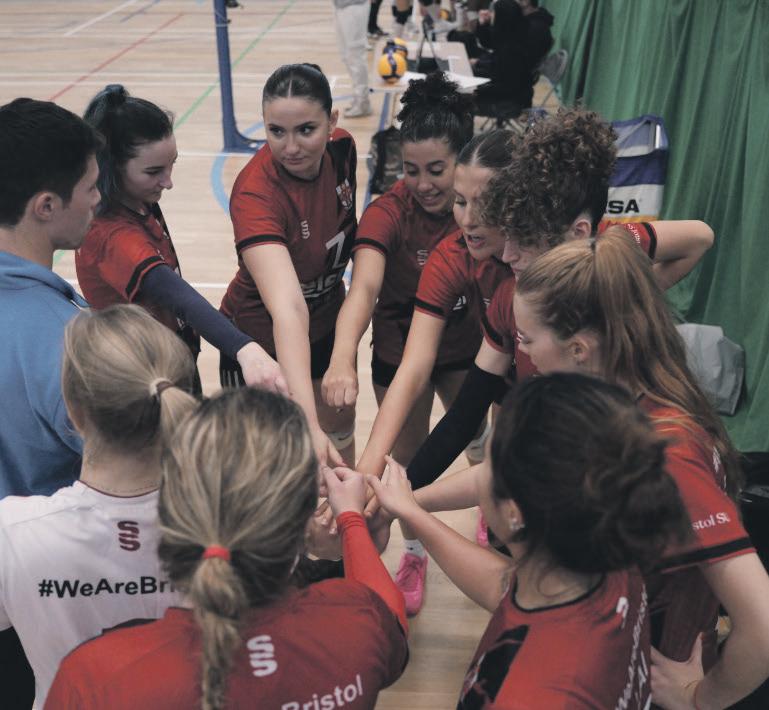
Naturally, Bristol Volleyball doesn't just shine under the lights of the Indoor Sports Centre. It's also known for its socials, where post-match pints are taken every bit as seriously as a winning point. Wednesday nights start with a trip to the White Harte, and then out to a rotating line-up of Bristol clubs. The society's legendary formals - Christmas, Valentine's and Summer - add an extra level of sparkle to the calendar.
And then there's the highlight of the year: tour. Each spring, the club heads to Portugal for the Deep-Dish Beach Volleyball Tour, joining universities from across the UK. 'It's a week of sun, sea and sand with some of your closest mates' said Sophia. Her favourite memory? Reaching a mixed-fours final on Centre Court, surrounded by the cheers of the entire Bristol contingent.
Moments like that capture what makes this community special. Whether you are diving for your first dig, or hammering home a match-winning spike, the encouragement never wavers. The society's mix of competitiveness and connection is its winning formula, one that keeps members returning season after season.
So, what would Sophia say to anyone considering joining? 'Just do it' she told me with a smile. 'Everyone is so welcoming'.
Volleyball at Bristol is more than just a sport: it's a team, a friendship network, and midweek highlight all rolled into one. If you're looking to bump up your social life, set new goals and spike stress right out of your system, the court is open. All that's missing is you.
Gilroy

ACROSS
1. Number hidden in this grid (6)
6. He (6)
7. Don't sink (4)
12. What someone who writes 'wierd' cannot do (4)
14. Cooper Emmy winner (4)
15. The University of Bristol's American football team, for short (4)
17. Library fully reopening this month (3)
19. Items commonly rolled or thrown (4)
20. Notoriously difficult woodwind instrument (4)
21. Fish house, perhaps (4)
24. Colourful carp (3)
26. Gemini is a chatty one (3)
28. American wheel coverings (5)
31. Herb traditionally found in stuffing (4)
33. Target score (3)
34. Type of port or ball (3)
35. Four-film series starring Jason Statham (11)
40. Cyber______; shortly follows 9-Down (6)
43. Crunch target muscle (3)
44. Guy who probably hates the 5th (6) DOWN
2. Subject of the Golden Circle (3)
3. ____ up (improve) (4)
4. Blue Origin founder (5)
5. Rockets synonymous with this time of year (9)
8. Tax-free savings account (3)
9. Exciting day for shopaholics (5,6)
10. What we do on the 11th (8)
11. Vocal improvisation (4)
13. Most aged (6)
16. D of D&T (3)
18. What someone writing a headline might consider (3)
22. Eurovision 1974 winning band (4)
23. Kat's partner (3)
25. iPhone operating system (3)
27. Rock containing valuable minerals (3)
29. ___ Wright (November born football icon) (3)
30. Period of history (3)
32. Television interruptions (3)
36. One hundredth of a pound (5)
37. Shine or polish (4)
38. What people might start gearing up for this month (4)
39. How you may feel in front of a fireplace or under a warm blanket (4)
40. Flavour enhancer used widely in Asian cuisine (3)
41. Noah's choice of transport (3)
42. Red one at dawn may be caution to some (3)
Porridge-eating orphan turns to crime in the Big Smoke
by Alice Guskov

Familiar with sudoku but not its killer counterpart? Worry not, the rules are very similar. It is still the case that each row and 3x3 square contain each number from 1-9 only once. The difference here is, dotted lines perimeter some groups of squares, and the little number attached to these is the sum total of the numbers within these groupings.
Can you figure out which numbers correspond to which letters of the alphabet to reveal the hidden fact?


We challenged one of Epigram's very own Literature Columnists Alex Boersma to come up with some... alternative descriptions for the plots of a few famous works - can you work out which ones she's describing?
Young boys are left alone and devolve into savage beasts

Husband and wife go on a killing spree and lose their minds in the process
The infamous all-seeing 'older sibling' keeps citizens constantly on edge
Crazed inventor traumatises several children
The Great Depression forces a family to flee their farmland